![]() ©
by
Dr.
Hilmar Alquiros,
The Philippines
Impressum Datenschutzerklärung
©
by
Dr.
Hilmar Alquiros,
The Philippines
Impressum Datenschutzerklärung
![]()
老子 道 德 經
Lǎozĭ Dàodéjīng
Translation + Commentary
Part 1: Dào 1–37
The WAY
Bronze – Zhou Dynasty (1122-221 BCE):
© Adrian Chan-Wyles, PhD, (ShiDaDao) 2014. http://icbi.weebly.com/etymology-of-the-ideogram-lsquodaorsquo.html
![]() www.icbi.weebly.com/icbi-projects.html
www.icbi.weebly.com/icbi-projects.html ![]() Qianfeng
Daoism (UK) - Introduction
Qianfeng
Daoism (UK) - Introduction ![]() Etymology
of the Ideogram ‘Dao’
Etymology
of the Ideogram ‘Dao’
道 etymology = "The head in motion; the motion of thoughts which are diverse; traveling through life with one's attention on the duality of unity with nature" [Nina Correa, p. 267].
The parts Dào and Dé have been interchanged in the Mǎwángduī scripts: chs. 1-37 follow chs. 38-81; furthermore, ch. 24 precedes chs. 22 and 23, chs. 40 and 41 have been interchanged, and chs. 80 and 81 are placed after ch. 66.
01 - The Mystical Way
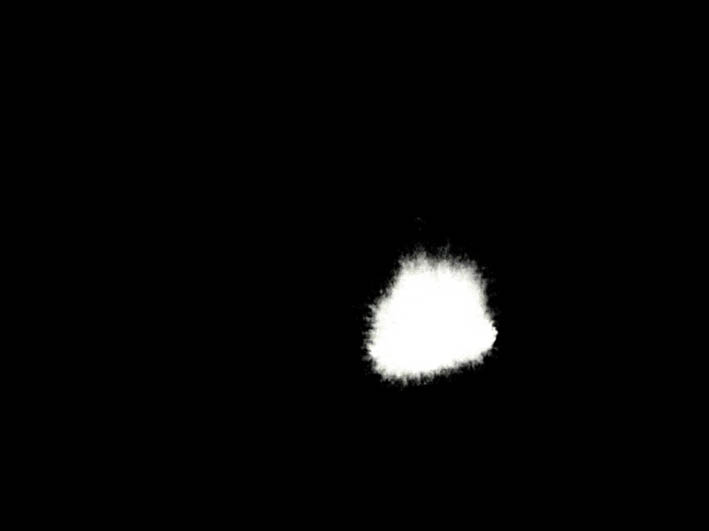
Wáng Bì 王弼 (226–249):
hànyǔ pīnyīn
道可道,非常道。
dào kě dào ,fēi cháng dào 。
名可名,非常名。
míng kě míng ,fēi cháng míng 。
無名天地之始。
wú míng tiān dì zhī shǐ 。
有名萬物之母。
yǒu míng wàn wù zhī mǔ 。
故常無欲以觀其妙。
gù cháng wú yù yǐ guān qí miào 。
常有欲以觀其徼。
cháng yǒu yù yǐ guān qí jiǎo 。
此兩者同出而異名﹐同謂之玄。
cǐ liǎng zhě tóng chū ér yì míng ﹐tóng wèi zhī xuán 。
玄之又玄,眾妙之門。
xuán zhī yòu xuán ,zhòng miào zhī mén 。
"The intellect ...
"does not want god inasmuch as he is God.
Why? Because, as such, he still carries a name.
And even if there were a thousand gods,
it would still break beyond:
it wants him where he has no name.
It wants something more noble, something better
than God as having a name."
Meister Eckhart's Mystical Philosophy.
Translation and commentary by Reiner Schürmann.
Lindisfarne Books, Great Barrington MA, 2001.
Lǎozĭ used the two meanings of Dào as a play on words, to introduce his "agnosticism" - here as the earliest overcoming of mythology in favor of a pure philosophy! - which, so early on, is only comparable to the Rigveda and to Protagoras!
01-06:
A Dào you can explain
is not the timeless Dào.
Concepts you can conceive
are not the timeless concepts.
World's beginning is inconceivable,
conceivable only as everything's origin.
Since "Dào" is a mere (auxiliary) designation for the unfathomable, that timeless transcendent primordial basis of all being and non-being, it cannot be explained in principle.
Accordingly, comprehensible concepts cannot be timeless for that unfathomable original beginning, because this ultimate original beginning of being from non-being and non-being from transcendent nothingness is unintelligible.
The Question of Being ("Why is something and not nothing?" - Leibniz et al.) remains timelessly metaphysical: the unfathomable can only be set as the origin of all forms of being (abstractions, things, events, living beings).
01-02 To explain means to situate in time and space, which is thus feasible with phenomena within our limited spacetime. Outside space and time, beyond the realm of reality, any claim to situate something ends up in the imaginary, inconceivably timeless abyss of absolute nothingness.
03-04 Correspondingly, within the subjective world of consciousness, the principle of naming as designation is suspended. Concepts of the inconceivable transcendence are vain un-words for imaginary timelessness; designations are only of use since the point at which nothingness emerged into any sort of beingness within spacetime.
05-06 Time started simultaneously as a projection of spacetime, hence time 'zero' is not understandable intellectually, but imaginable only as the primordial mother of ’every-thing’.
07-10:
Therefore: Without permanent desire,
contemplate its deep secret;
with permanent desire,
contemplate its limitations.
07-10 As long as our awareness is driven by desires, we perceive the surface and limitations of the phenomena of this mortal world; but when our consciousness is freed from desires, we behold and consciously perceive the subtleties and the mystery in the depths.
To adhere to the outline of the outer world lets us reveal the wonders of being; to be in harmony with the inner world of contemplation lets us illuminate the mystery of nothingness.
11-15:
These both emerge from one,
but differ in names:
together call them dark.
Darkness' even deeper darkness –
all mysteries' gate.
11-12 'Both of these' have been interpreted and referred to differently throughout the centuries, as:
[ Being & Nothingness (Buddhism),
[ beginning & mother [Wáng Bì]
[ with desire & without desire [et.al.],
[ nameless & named [v. Strauß],
[ mystery & limitations [h.a.]:
all those opposites bear different names, but emerge from out of the same origin: the great unity of opposites
13-15 Therefore, this unity may be called dark and obscure, profound and hidden, mysterious and mystical.
Dark as obscure and silent, made the beginning and that 'mother' arise: not 'defined' by Lǎozĭ, but merely 'designated' as the dark:
"The 'Dark' ... can not be designated as 'being thus' [and nothing else]. Should one designate it as 'being thus' [and nothing else], it would definitely [sic!] not be allowed to define it as one [specific] Dark.
Defining it as a [specific] dark, and nothing else, would be a definition, and that would be far off the mark. That is why Lǎozĭ says 'Dark and Dark-Again'." [Wáng Bì / Wagner 2003 p. 122-123].
The darkest of all darkness – this color of infinity; the last possible gate to 'Absolute Nothingness'... to the creative potential of transcendent Dào.
[
02 - The Unity of Opposites
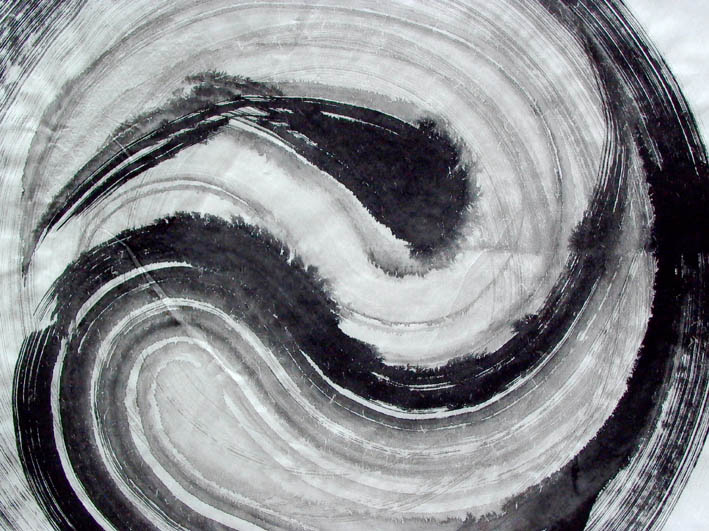
Wáng Bì 王弼 (226–249):
hànyǔ pīnyīn
天下皆知美之為美,斯惡已;
tiān xià jiē zhī měi zhī wéi měi ,sī è yǐ ;
皆知善之為善,斯不善已。
jiē zhī shàn zhī wéi shàn ,sī bú shàn yǐ 。
故有無相生,難易相成,
gù yǒu wú xiàng shēng ,nán yì xiàng chéng ,
長短相形,高下相傾,
zhǎng duǎn xiàng xíng ,gāo xià xiàng qīng ,
音聲相和,前後相隨。
yīn shēng xiàng hé ,qián hòu xiàng suí 。
是以聖人處無為之事,行不言之教。
shì yǐ shèng rén chù wú wéi zhī shì ,háng bú yán zhī jiāo 。
萬物作焉而不辭。生而不有,
wàn wù zuò yān ér bú cí 。shēng ér bú yǒu ,
為而不恃,功成而弗居。
wéi ér bú shì ,gōng chéng ér fú jū 。
夫唯弗居,是以不去。
fū wéi fú jū ,shì yǐ bú qù 。
Dào as the unity of all opposites is ultimately symbolized in the ancient Yin and Yang symbol 太極圖 Tài jí tú: flowing into each other in a complementary and dynamic fashion [.
01-02:
If everybody worldwide is aware of
beauty's acting as beauty,
then of ugliness, as well.
If everybody is aware of
goodness's acting as goodness,
then of the not good, as well.
01-02 This most basic natural law also shows its validity in the philosophical categories of esthetics and ethics: every human being becomes aware of how beauty and goodness, in their intuitive differences, simultaneously and inevitably create their own opposites: ugliness and evil.
03-08:
Therefore: Being and nothingness
mutually generate,
difficulty and easiness
complete each other;
length and shortness
mutually mould;
height and depth
lean towards each other;
sound and voice
mutually harmonize;
before and after
follow each other!
03-08 The same primordial principle, Heraclitus's enantiodromia – everything flows, changes and reversibly turns into its opposite – dominates the universe of reality, on the one hand, and the world of reality perception, on the other.
"Enjoying yourself and getting angry come out [thus] of the same door; therefore it is not possible to take up [only one of them] unilaterally. These six [pairs following the initial statement], they all bring out clear evidence that nothing in 'That-which-is-of-itself-what-it-is' 自然 can be taken up unilaterally" [* Wáng Bì / Wagner].
Rooted in the duality of being and nothingness ab initio, it must be just as true in the applied ontological levels of space and time, as well as for intellectual and emotional consciousness.
09-16:
Hence: Wise men stay
non-interfering in their affairs,
and practice teaching
without words.
Myriad creatures thus arise,
yet not declining;
they emerge,
yet not possessing;
they act,
yet not claiming.
They accomplish their tasks
without dwelling on it:
for just not dwelling on it,
so they do not vanish.
09-10 The fundamental Dàoist concept of 無為 wú wéi as effortless action is based on the principle of 自然 zì rán "of itself so", thus "naturally; spontaneously": in individual life as well as in governing a state.
Consequently, practicing Dào means interfering as little as possible in the harmony of Nature and her intrinsic, immanent power of self-regulation.
No intentional interference at all becomes damage prevention: effortless, doubtless, elegant – just as it is able to provide wordless teaching as an indiscernible model.
11-13 Accordingly, the disinterested impartiality and non-intervention of the sage allows the diversity of beings unceasingly to unfold.
Wordless teachers come forth to promote, not to own; their action without acting will never take any credit.
14-16 "It is exactly because that they do not install themselves [in these particular achievements] that they do not disappear." [*]: if they were only dependent on the Sage, they could not continue to exist.
Because of their selfless attitude, they fulfill their tasks, but they never dwell on it.
And just because they do not rest on their laurels, they will not fall into oblivion!
[
03 - Simplicity
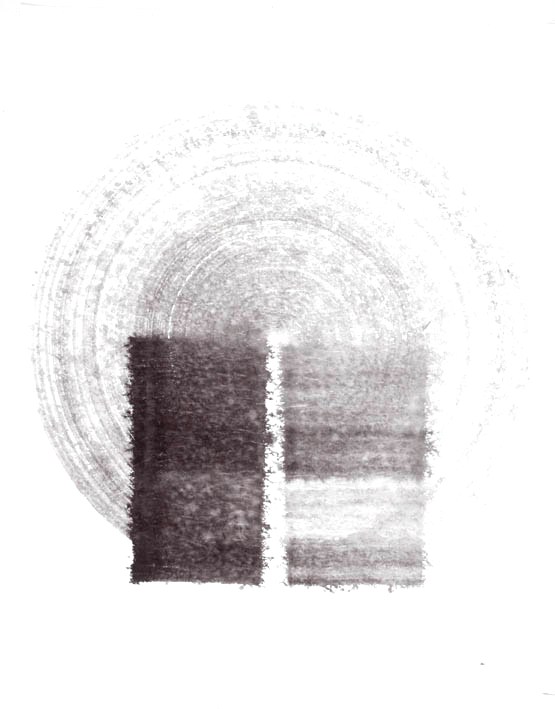
Wáng Bì 王弼 (226–249):
hànyǔ pīnyīn
不尚賢, 使民不爭。
bú shàng xián , shǐ mín bú zhēng 。
不貴難得之貨,使民不為盜。
bú guì nán dé zhī huò ,shǐ mín bú wéi dào 。
不見可欲,使民心不亂。
bú jiàn kě yù ,shǐ mín xīn bú luàn 。
是以聖人之治,虛其心,
shì yǐ shèng rén zhī zhì ,xū qí xīn ,
實其腹,弱其志,強其骨;
shí qí fù ,ruò qí zhì ,qiáng qí gǔ ;
常使民無知、無欲,
cháng shǐ mín wú zhī 、wú yù ,
使夫智者不敢為也。
shǐ fū zhì zhě bú gǎn wéi yě 。
為無為,則無不治。
wéi wú wéi ,zé wú bú zhì 。
[ The basic Dàoist principles are universal: they hold true for inanimate and animate systems, simple and complex forms of life, soulless beings and beings endowed with souls, and for individual and society.
[ In order to prepare the transfer of Dàoist insights onto the level of sagacious rulers, Lǎozĭ reveals the essential traps for the human heart: desire and covetousness.
01-06:
Not glorifying proficient ones
prevents people from competition.
Not overvaluing goods hard to obtain
let them not commit robbery.
Not to display desirable things
lets their hearts unconfused.
01-02 In reference to other people, this leads – as envy and jealousy or disguised as admiring and glorifying – to competition and the loss of the third of the Three Treasures in ch. 67.
Not exalting and glorifying the capable and honorable avoids the downward spiral of competition.
03-06 In reference to objects, rarity leads astray into robbery (ch. 53); wise men hide their treasures (ch. 70); wise leaders, their wealth and weaponry.
07-11:
Therefore, wise men's governing will ...
alleviate their desires,
satisfy their needs,
dampen their hearts,
strengthen their core.
07-11 Therefore, wise rulers, as role models, avoid all extravagance, exaggeration and excess (ch. 29), to dampen the people's desires, and to allay their hearts [ambition], but to strengthen the core of body and mind, and to foster their Inner Power.
"He empties [that which] has knowledge* [the heart] and fills [that which] has no knowledge [the belly]. Bones are without ambition and therefore strong. Ambitions create incidents and therefore lead to chaos. [In this manner] he permanently prompts the people to be without knowledge and desires." [* Wáng Bì / Wagner].
* "'Those who have knowledge' refers to those who have knowledge about [how to] act. If [they] engage non-interference, there will be nothing that is not well-ordered.” [Ditto for those who have desires]. [*].
12-15:
Constantly, they let people
without cunning and desire,
let those with knowledge
not dare to interfere.
To act without interfering
leaves nothing undone.
12-13 Competition gives birth to cunning – wise leaders always prevent such misuse of pure knowledge.
They do not let superior people dare to abuse the inferior ones – by interfering in the spontaneous self-regulating of social systems.
14-15 Non-interference means acting without acting: sagacious rulers trust in the fundamental Dàoist concept of 無為 wú wéi (ch. 02) as the effortless way to let nothing undone.
[
04 - Inscrutability
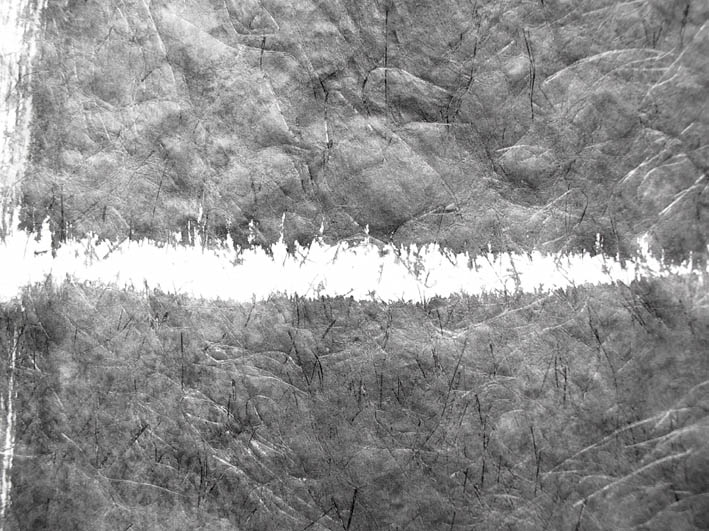
Wáng Bì 王弼 (226–249):
hànyǔ pīnyīn
道沖而用之或不盈。
dào chòng ér yòng zhī huò bú yíng 。
淵兮似萬物之宗。
yuān xī sì wàn wù zhī zōng 。
挫其銳解其紛,和其光,
cuò qí ruì jiě qí fēn ,hé qí guāng ,
同其塵,湛兮似或存。
tóng qí chén ,zhàn xī sì huò cún 。
吾不知誰之子,象帝之先。
wú bú zhī shuí zhī zǐ ,xiàng dì zhī xiān 。
[ "Dào is described as a paradoxical polarity: It stands for the emptiness of infinite potentiality." [Simon].
[ The transcendental part of Dào that goes beyond the border of singularity, Nothingness, means at the same "time" the ultimate potentiality.
01-04:
Dào: like pouring out, however, in use,
likely not to fill.
Abysmally deep, oh,
seemingly all beings' prime cause.
01-02 As the vacuum within the existing universe is already a plethora of virtual shortest-term beings, the creative emptiness in the imaginary realm of nothingness is all the more so infinitely overflowing.
Yet this formless void is never to be "filled" or to exhaust – wisely yearning for “time-wise” being.
03-04 The primordial breaking of the symmetry of the grand unity of being and non-being emerged from the purest potentiality.
Seeming absolutely inconceivable in its profundity, all being's prime cause is designated by all creatures as the most ancient ancestor: "time-wisely" yearning for timeless non-being.
05-08:
It blunts their sharpness,
dissolves their entanglement,
softens their glare,
becomes one with their dust.
05-08 Borrowed from ch. 56:
[ The balancing and redeeming essential characteristic of Dào – now in its immanent part – is elucidated by four illustrations.
[ Sharpness, entanglement, shine, and 'non-Oneness' are relieved by the gentleness of Dào: little by little, towards the originally unbroken symmetry.
[ At the end of the day of days, all created beings are released into oneness with their earthly dust; all objects, with their star dust.
This identification of Dào even with the dust of created beings was noted as being similar to the Christian idea of the synthesis of creator and created [v. Strauß 1870 p. 25].
09-12:
Concealed, oh,
it seems to 'exist' as pure possibility.
Whose child it be? I do not know:
evidently the prelude to the 'Lord' of Heaven!
09-10 The potentiality of Nothingness is already dreaming of the possibility of Something.
11-12 In the Dàodéjīng, 帝 dì, the 'Lord (of Heaven)', is mentioned only here: even this once highest god is reduced by Dào as its precursor.
The child looks for its ancestry: agnostic honesty worships the nameless, 'time-less', inconceivable Dào, the heavenly prelude to all 'created' (conceived) creators.
[
05 - Creative Emptiness
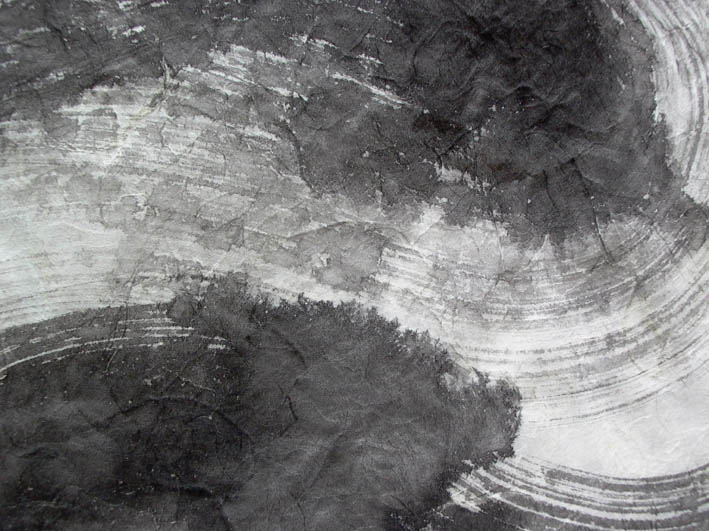
Wáng Bì 王弼 (226–249):
hànyǔ pīnyīn
天地不仁,以萬物為芻狗。
tiān dì bú rén ,yǐ wàn wù wéi zōu gǒu 。
聖人不仁,以百姓為芻狗。
shèng rén bú rén ,yǐ bǎi xìng wéi zōu gǒu 。
天地之間,其猶橐籥乎﹖
tiān dì zhī jiān ,qí yóu tuó yào hū ﹖
虛而不屈,動而愈出。
xū ér bú qū ,dòng ér yù chū 。
多言數窮,不如守中。
duō yán shù qióng ,bú rú shǒu zhōng 。
As a rule for social compatibility, Confucius's (孔夫子 Kǒng fū zǐ) humaneness (仁rén) is anthropocentric, hence biased, and not as universal as the Dào.
Mother Nature operates above all human claim of exceptionalism.
01-04:
Heaven and Earth are not 'humane' –
for all creatures are regarded as
straw dogs to sacrifice.
Neither are wise rulers 'humane' –
for all people are similarly regarded as
straw dogs to sacrifice.
01-04 At the end of their days... all creatures' temporary existence will be sacrificed like ritual straw dogs (sumptuously decorated, then carelessly thrown away) - for the higher idea of evolution: unbiased, impartial (ch. 79) vis-à-vis 'every-thing', and, to this extent, not "humane".
With "... Pity and interference, the entities would not persist in their entirety [because this pity and interference would be partial and prefer some over others]. If the entities would not persist in their entirety, then [Heaven and Earth] would fail to completely take care of [all of the entities]." [Wáng Bì / Wagner]
The sages live the Dào as Dé, before both are lost to humanity (ch. 18, 38), thus embodying the universal integrity of the Dào: as a role-model for an all-embracing ruler without any nepotism.
05-08:
Heaven and Earth – their interspace
resembles the bellows:
empty, and yet not collapsing:
in motion generating all the more.
Bellows or 'Drum or Flute': "...drum and flute are empty and hollow. [The flute] has no feelings [of its own to prefer one sound over the other]. [The drum] has no activity [of its own to create this resonance rather than another]."
Both, drum and flute, are inexhaustible, and so the space between Heaven and Earth is inexhaustible; keeping to the middle, they "discard their selves and put themselves at the service of other entities so that there is none that is not well-ordered." [*].
Being is born from Nothingness (ch. 40), that voluptuous, creative void.
05-08 [scholion]. There are more things in Heaven and Earth... [Hamlet I, 5], because of the inexhaustible driving force of the empty space between them: creatively fluctuating, but never collapsing – while forging our fate.
Once in motion, the perpetuum mobile of the Dào, symbolized as the bellows of Nature, will nurture and care for all entities continuously.
09-10:
Many words frequently exhaust themselves;
not just as if keeping your center.
Proverbial wisdom in rhyme:
窮 qióng + 中 zhōng, which recall Wittgenstein's "Where-of one cannot speak, thereof one must be silent." ["Wovon man nicht sprechen kann, darüber man man schweigen.", transl. by Ogden].
09-10 From the self-limiting of the surface to the depths of contemplation (ch. 1), the network of words must be exchanged for the sound of silence, the perplexity of the periphery for the security of the center.
Let go and find.
[
06 - The Mystical Female
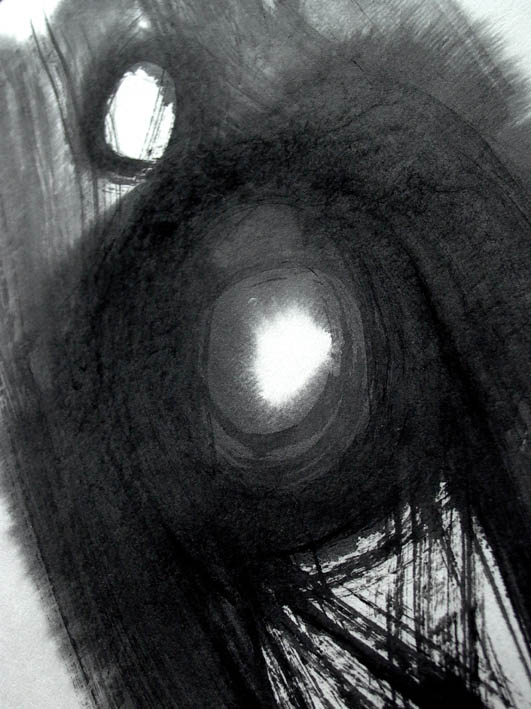
Wáng Bì 王弼 (226–249):
hànyǔ pīnyīn
谷神不死是謂玄牝。
gǔ shén bú sǐ shì wèi xuán pìn 。
玄牝之門是謂天地根。
xuán pìn zhī mén shì wèi tiān dì gēn 。
綿綿若存,用之不勤。
mián mián ruò cún ,yòng zhī bú qín 。
[ Mentioned in 列子 Lièzǐ (~ 440-360) as pre-Lǎozĭ rhymed (aa bbbb) teaching, going back to the 'Yellow Emperor'.
[ Alternative interpretation: life-prolonging breathing techniques by 河上公 Héshàng Gōng – ridiculed by 庄子 Zhuāngzǐ (~ 365-290) in ch. XV.
01-06
The spirit of the valley is immortal:
called the dark female...
Mystic female's gate –
called Heaven's and Earth's root:
intangible, though seemingly existing –
inexhaustible its use.
01 "The 'Spirit of the valley' is the non-valley in the middle of the valley" [王弼 Wáng Bì / Wagner, 2000, 210].
The Spirit (ch. 29) of the valley (ch. 39.04-05) is form- and motionless, passive-low (ch. 66, 32; 28) – as the empty middle surrounded by fullness (ch. 11, 5), calm as the highest entity.
This Yin perspective of the Dào is like a riverbed that flows out endlessly and whose flowing into being will never run dry.
02 Called (謂), but not defined (名) as, mysterious, dark (~Heaven) and female (~Earth): the transcendent, nameless, inexhaustible Dào, once it has passed through the birth canal of the Gate, becomes womb and nurturing mother of ‘every-thing’.
03-04 That mystic gate of the feminine (ch. 1) – between Beginning and Mother, gives life to Yin and Yang as the basis of all entities, also called the root (source and origin; ch. 16) of Heaven and Earth.
05-06 Intangible: Dào is immaterial and inconceivable, but, nonetheless, just as if existing: ... like a (never-ending) silken string, if one wishes that it is there, it does not show its form, if one wishes that it is not there, all entities indeed come into being by virtue of it.
Inexhaustible: no entity is not completed by it, but while being used, Dào always gives effortlessly.
[
07 - Everlasting unselfishness
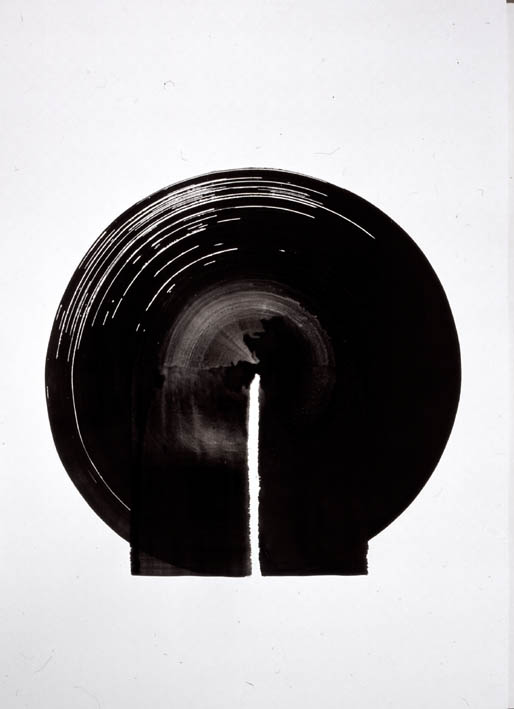
Wáng Bì 王弼 (226–249):
hànyǔ pīnyīn
天長地久。
tiān zhǎng dì jiǔ 。
天地所以能長且久者,
tiān dì suǒ yǐ néng zhǎng qiě jiǔ zhě ,
以其不自生,故能長生。
yǐ qí bú zì shēng ,gù néng zhǎng shēng 。
是以聖人後其身而身先,
shì yǐ shèng rén hòu qí shēn ér shēn xiān ,
外其身而身存。
wài qí shēn ér shēn cún 。
非以其無私邪!故能成其私
fēi yǐ qí wú sī xié !gù néng chéng qí sī
Only Dào is timeless.
Humility preserves, frugality fulfills.
01-04:
Heaven seems constant,
Earth seems enduring.
Therefore Heaven and Earth
can be constant and stable:
because they do not persist for themselves,
hence they can exist constantly.
01 "Heaven 'excels', Earth persists ... Should they live for their own interests, they would struggle with [other] entities. As they do not live for their own interests, the [other] entities relate back to them." [王弼 Wáng Bì / Wagner].
Hence, after having passed the Gate to non-nothingness, Dào is everywhere between Heaven and Earth unconditionally constant and enduring.
02 Still following the spirit of Dào, all world has the capacity (Dé) of being constant and enduring.
Hereby Heaven and Earth obey the laws of Nature, which in turn follow the model of Dào, touching its timelessness.
03-04 Dào is not selfish (ch. 2, 13, 19, 22, 26) and it acts without making demands (ch. 2, 34).
Accordingly, Heaven and Earth do not follow any purposes of their own, they do not "live" for themselves, and therefore they are able to persist and to be called "long-lived".
05-10:
Hence: Wise men
put last their own person,
and yet are they themselves ahead;
they renounce their self-concerns,
and yet is their person preserved.
Is that not, because
they have no self-interests?
Thus, they can fulfill
their private aims.
05-08 Wise men emulate Nature's unselfish, impartial, and unbiased Way.
Accordingly, they put their selves last, they pay no heed to their own interests and relinquish their own persons.
Yet the "motherly" paradox of Dào's acting without acting leads the sages ahead of all others and lets their persons be preserved.
09-10 Lǎozĭ's rhetorical question aims at aimless self-forgetfulness as the crucial trait of the sage’s nature.
In the end, he emphasizes just this quality as being essential to allowing them, paradoxically, to fulfill their own interests and to accomplish their personal aims.
V. Strauß compares that with "So the last will be first, and the first will be last." [Matthew, 20:16] and "And whosoever shall exalt himself shall be abased; and he that shall humble himself shall be exalted." [Matthew 23:12], in Nietzsche's version: "...and he that shall humble himself intends to be exalted."
[
08 - Flexibility without competition
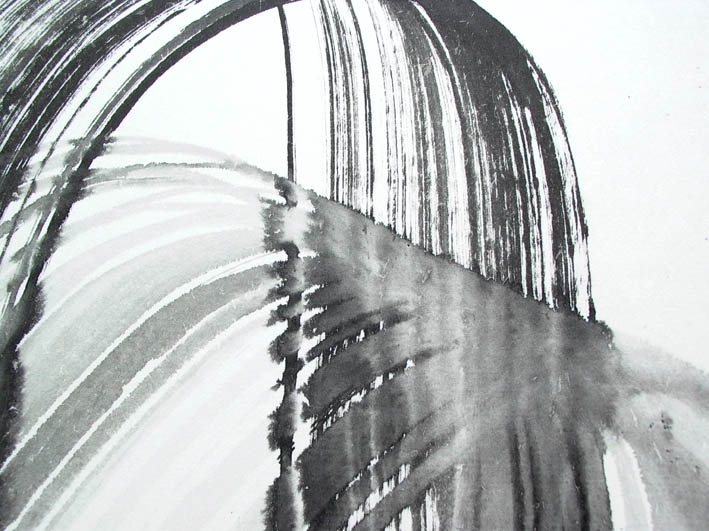
Wáng Bì 王弼 (226–249):
hànyǔ pīnyīn
上善若水。
shàng shàn ruò shuǐ 。
水善利萬物而不爭,
shuǐ shàn lì wàn wù ér bú zhēng ,
處眾人之所惡,故幾於道。
chù zhòng rén zhī suǒ è ,gù jǐ yú dào 。
居善地,心善淵與善仁,
jū shàn dì ,xīn shàn yuān yǔ shàn rén ,
言善信,正善治,
yán shàn xìn ,zhèng shàn zhì ,
事善能,動善時。
shì shàn néng ,dòng shàn shí 。
夫唯不爭,故無尤
fū wéi bú zhēng ,gù wú yóu
Dào - The Water Course [A. Watts].
01-05:
Supreme goodness is like water:
its goodness benefits all creatures –
yet without competing.
It dwells in places which everyone disdains –
hence, close to Dào.
01 Both the highest goodness and wise men (and rulers) who have reached the supreme goodness are symbolized by water: its yielding quality and adaptability, its readiness and unselfishness.
"The others abhor low [positions]" ... water is "close to", not identical with the Way, because it embodies an entity. [*王弼 Wáng Bì / Wagner].
'Close to' means here both 'similar' and 'nearby'; maybe the Old Master did this intentionally [v. Strauß 1870 p. 39].
02-03 Just as water is vital for the myriad of life forms, inconspicuous and unobtrusive goodness represents the ethical essence of wise rulers for all subjects.
For both, water and guidance, the intrinsic core of cooperativeness is inalienable: ever to meet, never to compete.
04-05 Indispensable too, both for the symbol of water and the supreme goodness of impartial governing, is the unrestricted readiness and availability to flow everywhere: also and especially into the lowest, most unattractive places, which any spirit of competition would disdain.
This is the Way... to attain nearness to Dào.
06-12:
Goodness:
In dwelling – low places,
in heart-mind – depth,
in giving – humaneness,
in conversation – sincerity,
in administration – order,
in business – competence,
in acting – timeliness.
Wise men's goodness follows the course of water.
The philosophical foundation and general principles of goodness – as unlimited flow and all-governing rule near to Dào! – are now to be elucidated by seven practical implementations as follows:
06-12 Goodness:
[ Good dwelling does not eschew low places; wise leaders live in lowliness and thereby ground their inner authority.
[ To a humble heart, goodness gives depth; to a mindful mind, profundity.
[ Good giving is cooperative, and, to this extent, humane and on an equal footing.
[ Goodness in talking is based on being sincere and truthful.
[ Good administration is done in a silent way: 'regulation without regimentation'.
[ Good business practices are premised on honest competence and select expertise.
[ The quality of acting requires timeliness, spontaneous actuation is based on a good sense of timing.
13-14:
For only no competing,
hence no resentment.
13-14 The rule of rules, not to enter into competition, is indispensable:
[ cooperation instead of competition,
[ open-mindedness instead of discrimination,
[ common good instead of individual advantage,
"This means that water corresponds in all these qualities to this Way." [*].
They constitute the spiritual framework: for a realm without rancor, for a resort without resentment.
[
09 - Letting Go
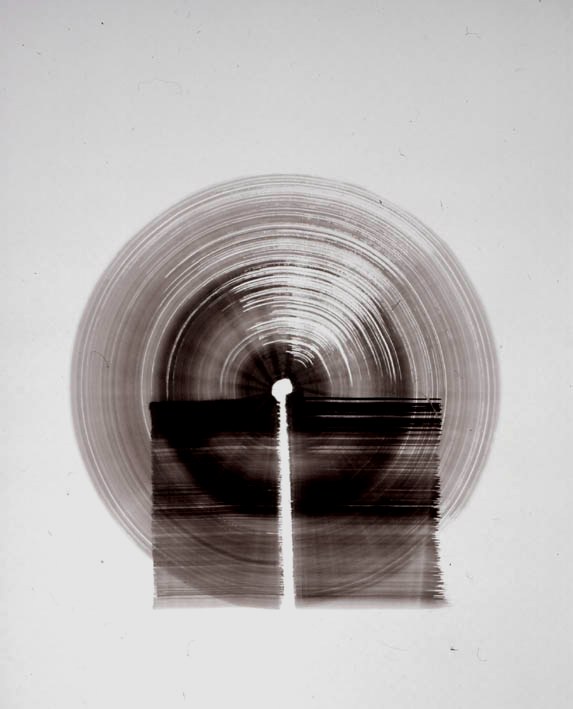
Wáng Bì 王弼 (226–249):
hànyǔ pīnyīn
持而盈之不如其己;
chí ér yíng zhī bú rú qí jǐ ;
揣而銳之不可長保;
chuāi ér ruì zhī bú kě zhǎng bǎo ;
金玉滿堂莫之能守;
jīn yù mǎn táng mò zhī néng shǒu ;
富貴而驕,自遺其咎。
fù guì ér jiāo ,zì yí qí jiù 。
功遂身退,天之道。
gōng suí shēn tuì ,tiān zhī dào 。
In light of the cyclical dance of the Yin Yang duality in all Nature, human attempts to maximize ways and means constitute short-lived episodes, which are doomed to fail.
01-04:
Maintaining and also overdoing things –
not as good as letting them end.
Polishing while sharpening –
cannot protect for long!
01-02 To hold a vessel with both hands and to fill it to the brim, to preserve something and to overdo it, to use something and to overstretch it at the same time – better to let it be.
"'To maintain' refers to [what in Lǎozĭ 38 is called] 'not to let go of the receipt / capacity.' If [he] already does let go of this capacity, but still adds on to it, [this results in] a situation where there is an unavoidable danger of being toppled." [*王弼 Wáng Bì / Wagner].
03-04 To polish and to grind a blade, to temper and to over-sharpen a double-edged sword – the path of perfection will not protect for long.
"If one has already polished the tip [of a sword] so that it becomes pointed, and grinds it in addition so that it becomes sharp, a situation [arises] where it is unavoidable that one will suffer a defeat." [*].
05-08:
Nobody can guard palaces
filled with gold and jade.
Wealthy and honored, yet haughty –
self-surrendering one's calamity.
After some useful equipment in war and peace, now wealth and fame get clarified:
05-06 Never display your treasures: precious things in palaces cannot be preserved for long... not as good as having nothing.
07-08 Also never display your merits: like wealth, also fame and honor are often linked to haughty arrogance.
This will bring calamity and disaster upon you – pride comes before the fall.
09-10:
Retreat after your work is done:
the Way of Nature.
Dào as Mother of every-thing is also method, process, procedure – as the Way of Heaven, as the Way of Nature.
09-10 When the task is accomplished, the work completed...
[ The Way of Dào demonstrates to a wise ruler how hereafter to withdraw oneself: Dào goes back to its invisible origin.
[ "The four seasons alternate, when the task [of one of them] is completed, there is a change [to the next one]." [*].
[ Both sages and wise leaders also return to their point of departure – and to the next phase in the everlasting cycle.
[
10 - Purity and Modesty
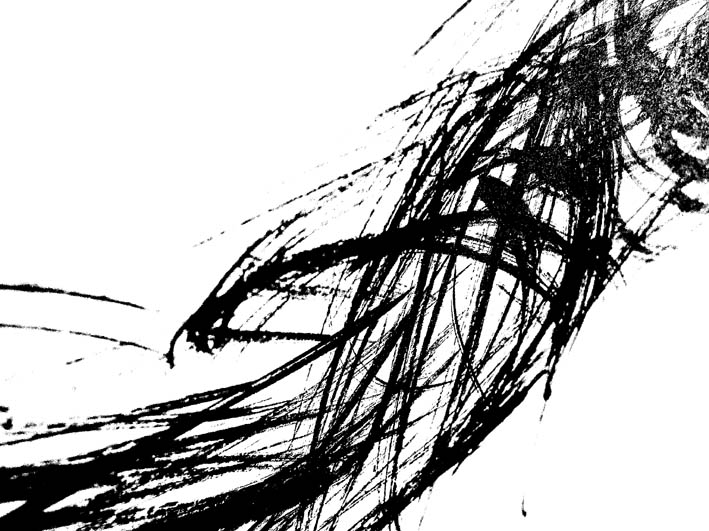
Wáng Bì 王弼 (226–249):
hànyǔ pīnyīn
載營魄抱一,能無離乎﹖
zǎi yíng pò bào yī ,néng wú lí hū ﹖
專氣致柔,能如嬰兒乎﹖
zhuān qì zhì róu ,néng rú yīng ér hū ﹖
滌除玄覽,能無疵乎﹖
dí chú xuán lǎn ,néng wú cī hū ﹖
愛國治民,能無為乎﹖
ài guó zhì mín ,néng wú wéi hū ﹖
天門開闔,能為雌乎﹖
tiān mén kāi hé ,néng wéi cí hū ﹖
明白四達,能無知乎。
míng bái sì dá ,néng wú zhī hū 。
生之,畜之,生而不有;
shēng zhī ,chù zhī ,shēng ér bú yǒu ;
為而不恃;長而不宰,
wéi ér bú shì ;zhǎng ér bú zǎi ,
是謂玄德。
shì wèi xuán dé 。
The statements "!" / questions "?" in 01-12, which demand a "yes", were called Dàoist Hymn [Waley] or catechism [Schwarz].
01-06:
Preserve spirit and soul, keep their unity,
can you be unsplit, indeed?
Focus your vital energy, reach suppleness,
can you be like a newborn child, indeed?
Wash away your dark visions,
can you be immaculate, indeed?
The lines 01-06 are focussed on individual self-improvement:
01-02 The general Dàoist principle of "Unity of Opposites" is here applied to the Spiritual soul of Yang (breathing / exercises, consciousness) and the Bodily soul of Yin (blood / circulation, perception) – and to how to combine both forces into undivided Oneness, into the Flow of Dào that lives in Dé.
Hence, Lǎozĭ seems to distinguish 營 yǐng the “spiritual soul” and 魄 bō the "mortal soul", which is attached to the body, in a manner similar to Aristotle's ψυχή and νοῦς [v. Strauß 1870 p. 46].
03-04 Focusing on the 氣 Qì (ch. 42), as liaison of both souls, allows the necessary yielding quality and suppleness of a newborn to be achieved (ch. 10, 28, 41); it preserves the abundance of its Inner Power (ch. 55), being reminiscent of the Upanishads ("The Brahmin should quit learning and become like a child."), and, later on, 耶穌 Yē sū.
05-06 Spotlessly cleansing the inner mirror of consciousness from dark visions can be accomplished: by being free of desires (ch. 1), by contemplating the blessings of nothingness (ch. 11, 14, 48), by making what is murky clear thanks to the circumspection of silence, and by creating serenity thanks to the circumspection of enduring movement (ch. 15).
07-12:
To love the people, to guide the country:
can you do that without cunning, indeed?
Like Heaven’s Gate opens and closes –
can you act in that female-passive way, indeed?
To reach an all-around understanding:
can you do it without cunning, indeed?
The lines 07-12 aim at supra-individual conclusions, mainly for the ruler of the state:
07-08 If the abovementioned individual ethical qualities are represented in the spirit and soul of the ruler, he will lead by way of disinterested love 愛 ài for the people, by way of non-interfering action without cunning, guidance without ruse.
09-10 According to a dark myth of creation [Wilhelm, 1910; Trauzettel, 1999], Heaven's Gates transform Dào's transcendent state of nothingness into 'every-thing' by constantly opening and closing "as phases of order and chaos, with pervasive effects on all under Heaven". [Wáng Bì 王弼].
Later on, Religious Dàoism chose the alternative, concrete meaning of nostrils, to underline their breathing techniques.
All changes and effects of Heaven's Gates are accomplished in a female way, not leading, but adapting spontaneously: like a hen is responsively caring for all, but not leading or actively interfering. Thus also a ruler, following this female principle, will enjoy subjects that follow him of their own accord.
11-12 A leader can achieve a deep and comprehensive understanding, without deception and delusion, without ruse or political cunning, because he has no personal interest.
Cf. ch. 37: "The Eternal of the Way is without interference. ... If dukes and kings were only able to hold on to [the Eternal of the Way], the ten thousand kinds of entities would change [for the better] of their own accord." [*].
13-17:
Creating and caring;
producing, yet not possessing;
dealing, yet not depending on;
conducting, yet not commanding –
this is called deep Inner Power.
13-16 Dé, the reification of Dào as Inner Power, or "subjective objectification"(!), comprises creating and caring for aspects of Dào:
[ of Nature (creating, not possessing),
[ of Humans (bringing about, not building on),
[ of the Earth (leading, not commanding).
17 After "Creating and caring" identical with ch. 51, 15-18!
[
11 - Creative Nothingness
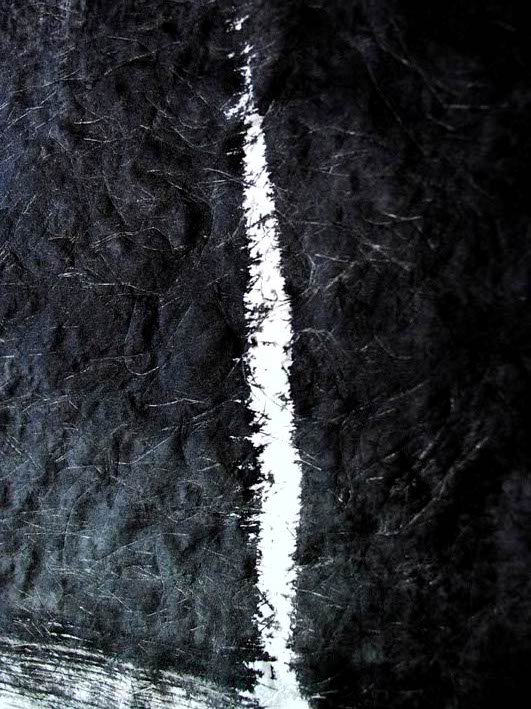
Wáng Bì 王弼 (226–249):
hànyǔ pīnyīn
三十幅共一轂,
sān shí fú gòng yī gū ,
當其無,有車之用。
dāng qí wú ,yǒu chē zhī yòng 。
埏埴以為器,
shān zhí yǐ wéi qì ,
當其無,有器之用。
dāng qí wú ,yǒu qì zhī yòng 。
鑿戶牖以為室,
záo hù yǒu yǐ wéi shì ,
當其無,有室之用。
dāng qí wú ,yǒu shì zhī yòng 。
故有之以為利,
gù yǒu zhī yǐ wéi lì ,
無之以為用。
wú zhī yǐ wéi yòng 。
In Western thought Being tends to dominate Non-Being: Being, in naive perception, as ontological bedrock, Non-Being as mere absence – as a placeholder... with echoes of the atom and void of Democritus.
In Chinese thinking, 無 wú and 有 yǒu have equal rights, they are complementary "twins", the present of something and of nothing (ch. 02, 04, 05, 14, 40, 43).
01-02:
Thirty spokes join on one hub:
just its non-being
is the chariot's usability.
01-02 The first of Lǎozĭ's three wisely chosen parables compares the thirty (= days of a month) spokes, oriented to and sharing the single hub in the center:
Matter changes into form, form becomes essence and purpose, condenses into nothingness as meaningful and useful void.
03-04:
Mould clay, so to form a vessel:
equally its non-being
is the vessel's usability.
03-04 The second example of a useless lump of clay, which is shaped into a useful vessel, is as fundamental as it is striking: only emptiness can be filled and fulfilled!
In "The Thing", Heidegger used Lǎozĭ's parable, oddly enough without mentioning the source, even though he did not hide his admiration for this ultimate profundity. His jug’s thingness is in fact the void inside it: shaping the void means to shape the jug. “The empty space, this nothing of the jug, is what the jug is as a holding vessel.” [Philosophy of Technology, 2th lecture].
05-06:
Chisel out doors and windows,
accordingly form a living space:
equally its non-being
is the room's usability.
05-06 The third elucidation of doors and windows in a house re-emphasizes the Yin function of 'no-thingness' inside the Yang basis of being.
No windows – no light, no life. No doors – a prison, a tomb. Nothingness gives and maintains life.
07-08:
Therefore: Being effects
accordingly advantages,
Non-being accordingly effects usability.
07-08 The Unity of opposites inside the world of things (Chang, Tsung-Tung, 1982) having now been illuminated three times, Lǎozĭ highlights the essential characteristics of the ontological siblings, sister Yin and brother Yang: usability and advantage.
[ "The three [wheel, vessel, room] are made from wood, clay, and mortar, respectively, but all [depend] on negativity for their usability. This [Laozi statement] means: Entities in order to be beneficial all depend on negativity for their usability." [Wáng Bì 王弼 / Wagner].
[ The 'void element' is "capable, being itself the minimum, to control the many..." [*].
[ The benefits of Being and the functionality of Non-Being flow into each other, building an ontological unity of Quantity and Quality.
"For all must fall into nothingness,
If it wants to persist in Beingness."
("One and All", Goethe).
[
12 - Unaddicted Harmony
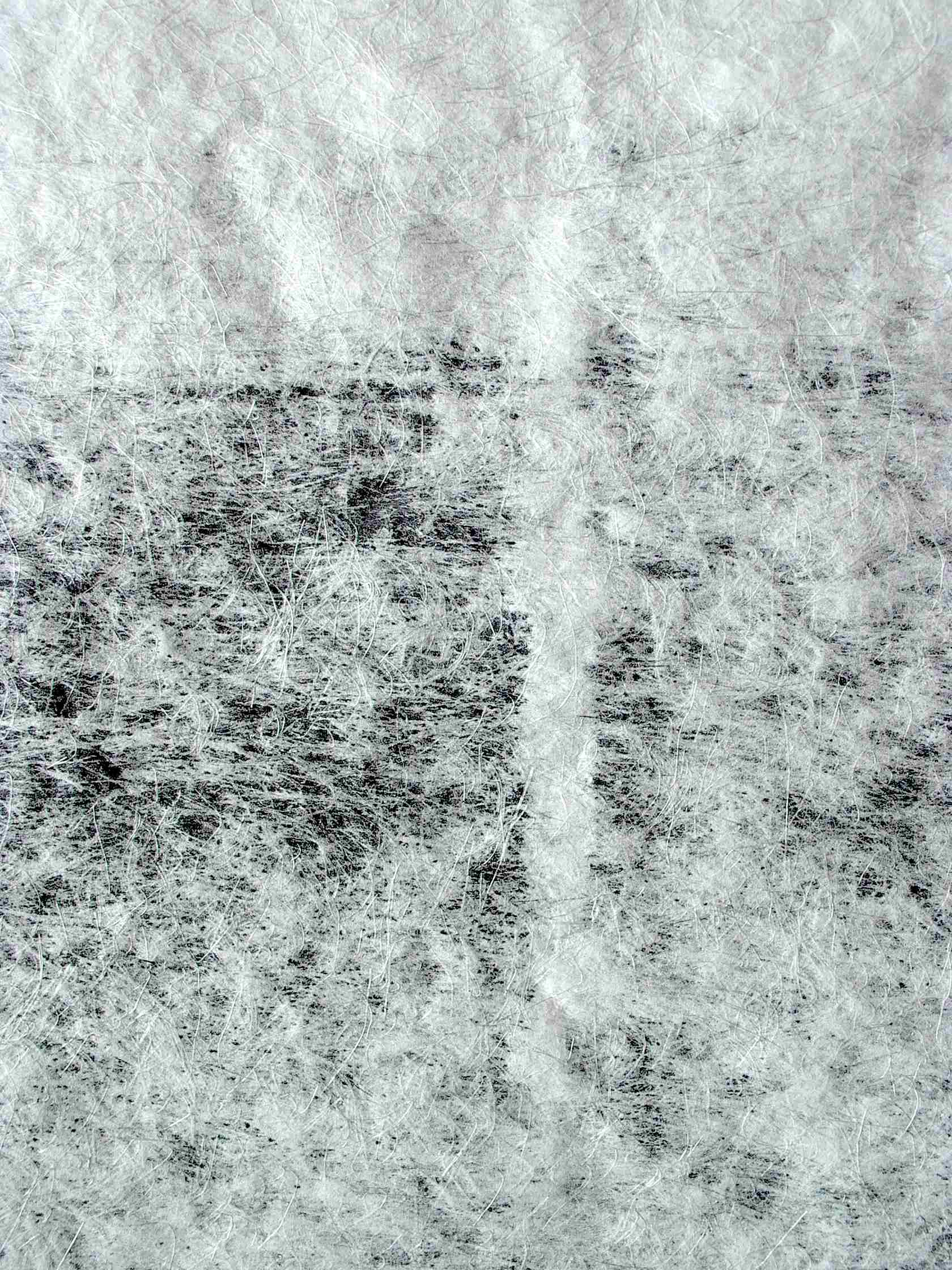
Wáng Bì 王弼 (226–249):
hànyǔ pīnyīn
五色令人目盲,
wǔ sè lìng rén mù máng ,
五音令人耳聾,
wǔ yīn lìng rén ěr lóng ,
五味令人口爽,
wǔ wèi lìng rén kǒu shuǎng ,
馳騁畋獵令人心發狂,
chí chěng tián liè lìng rén xīn fā kuáng ,
難得之貨令人行妨。
nán dé zhī huò lìng rén háng fáng 。
是以聖人,為腹不為目,
shì yǐ shèng rén ,wéi fù bú wéi mù ,
故去彼取此。
gù qù bǐ qǔ cǐ 。
[ In ch. 1 sensuality and spirituality were juxtaposed in complementary fashion, with regards to the perception of limiting or mysteries, surface or profundity.
[ Here, Lǎozĭ philosophically counterposes natural needs of human beings and pursuit of pleasure as harmful exaggerations of desire.
01-03:
Too many colors
blind the human eye;
too many tones
deafen the human ear;
too many flavors
dull the human taste.
01-03 Too many...
[ The concrete five colors – in ancient China blue(-green), yellow, red, white, and black – are the optical example of menacing sensory overload, threatening sensory and inner blindness.
[ The five sounds or notes of the old Chinese scale – prime, major second, major third, fifth, and major sixth, lead, as concrete acoustical illustration, in case of exorbitance to deafness and tin ear...
[ The five tastes or flavors – salty, bitter, sour, spicy, and sweet – when overused due to greed, make our mouth numb and lead to 'aberrations in taste'.
04-07:
Horse racing and battue hunting
let the human heart go mad,
goods hard to obtain
let block the human unfolding.
After three kinds of senses, Lǎozĭ adds two perils of passion:
04-05 Racings and raptures make the human heart confused, fever and fervor drive the human mind to madness.
06-07 "Goods that are hard to get block man's correct path. In that sense they 'block man's actions'." [Wáng Bì 王弼 / Wagner].
Treasuring rare goods (ch. 03), commerce and money (ch. 53), chasing after costly things – all that will inhibit the inner maturation and block the path.
08-10:
So wise men:
care for needs,
not for desires;
hence, they reject this
and choose that.
08-10 A wise ruler..
[ firstly cares for the elementary needs of all subjects before sophisticated desires, for the stomach, not the insatiable eye:
[ "'He who is for the belly' feeds his own person with other things. 'He who is for the eye' puts himself into service [of other things] with his eye. Therefore the Sage is not for the eye." [*].
[ The sage avoids all greed for profits (ch. 46), he rejects avarice and avidity, and instead he chooses to lose daily, to win the Dé of Dào.
[
13 - Autonomous Self-Esteem
Wáng Bì 王弼 (226–249):
hànyǔ pīnyīn
寵辱若驚,貴大患若身。
chǒng rǔ ruò jīng ,guì dà huàn ruò shēn 。
何謂寵辱若驚﹖
hé wèi chǒng rǔ ruò jīng ﹖
寵為下。
chǒng wéi xià 。
得之若驚失之若驚
dé zhī ruò jīng shī zhī ruò jīng
是謂寵辱若驚。
shì wèi chǒng rǔ ruò jīng 。
何謂貴大患若身﹖
hé wèi guì dà huàn ruò shēn ﹖
吾所以有大患者,
wú suǒ yǐ yǒu dà huàn zhě ,
為吾有身,及吾無身,
wéi wú yǒu shēn ,jí wú wú shēn ,
吾有何患?
wú yǒu hé huàn ?
故貴以身為天下,若可寄天下。
gù guì yǐ shēn wéi tiān xià ,ruò kě jì tiān xià 。
愛以身為天下,若可託天下。
ài yǐ shēn wéi tiān xià ,ruò kě tuō tiān xià 。
Human beings possess self-consciousness, therefore they act self-referentially; Lǎozĭ reveals this as crucial for people's value system.
01-02:
Favor and disfavor
frighten equally,
honors are big worries
similar to our selfness.
01 Favour and disfavour are unstable and can change into each other.
02 Being in a high social position is a disaster – for the leader's person and his selfhood.
03-07:
What is meant by: 'Favor and disfavor
frighten equally'?
Favour works degrading –
it is like frightening to attain it,
it is equally frightening to lose it –
that is meant by: 'Favor and disfavor
frighten equally'.
03-07 Surprising new considerations raise questions here – and look for answers to them:
"Where there is favor there necessarily is disgrace. Favor and disgrace are equal. If those below receive favor and disgrace, [equally] startling, then they will not be in a position to bring chaos to the empire." [*Wáng Bì 王弼 / Wagner].
A wise ruler, impartial, and acting without interference, will avoid both, favour and disfavour to spare his subjects any humiliating and embarrassment, when they sooner or later will obtain or lose them. That's why!
08-11:
What is meant by: "Honors are big worries
similar to our selfness"?
I thereby have big worries
because I am selfish.
If I reached selflessness, which worries
would I still have?
08-11 The second question, following the second statement above, focuses on honor and its own antagonist, the disaster of dishonor:
"Where there is splendor, there necessarily is disaster. Splendor and disaster amount to the same. If those below receive splendor and disaster as [equally] startling, then they will not be in a position to bring chaos to the empire." [*].
Worries will be inevitable as long as the leader's person and personality suffer – as painfully as the body can suffer – from selfness, always risking self-referentiality or even selfishness.
So, to avoid any worries, the Sage follows Lǎozĭ's advice in ch. 7: "they renounce their self-concerns, and yet is their person preserved."
12-15:
Therefore, they who appreciate to act
with their selfness for all world,
seemingly to them
one can give the world;
who love to act
with their selfness for all world,
seemingly them
one can entrust with the world.
Logically, the last part is now dedicated to the question of what best selection criteria allow an ideal ruler to be found.
His personality must not be altered or diminished by favour or disfavour, by honor or dishonor.
12-13 The first criterion considers for the candidate's intellectual approach to the realm (the world):
"'There is no other' entity by which his personality could be 'altered' [if makes use of the characteristics of soft water in overcoming the hard as the Laozi 78.1 says], that is why the text says 'being respected'. Once he has come to this point, then indeed he can be entrusted with All Under heaven." [*].
Those who appreciate caring for all the world with their whole person, they obviously are the right ones to whom the direction of the state should be given.
14-15 A more emotional aspect ensures the comprehensive suitability for being an unselfish, thoughtful ruler:
"There is no other entity capable of diminishing his personality, therefore [the text] says 'being cherished'. If he has come to this point then indeed he can be put in charge of All Under Heaven. If his personality can be altered or diminished neither because of favor of disgrace nor because of splendor or disaster, then indeed All Under Heaven can be handed over to him." [*].
They who love with all their personality to act on behalf of the world, seemingly one can entrust them, to act without acting, to rule the Middle Kingdom without commanding it.
[
14 - The Incomprehensibility of Dào
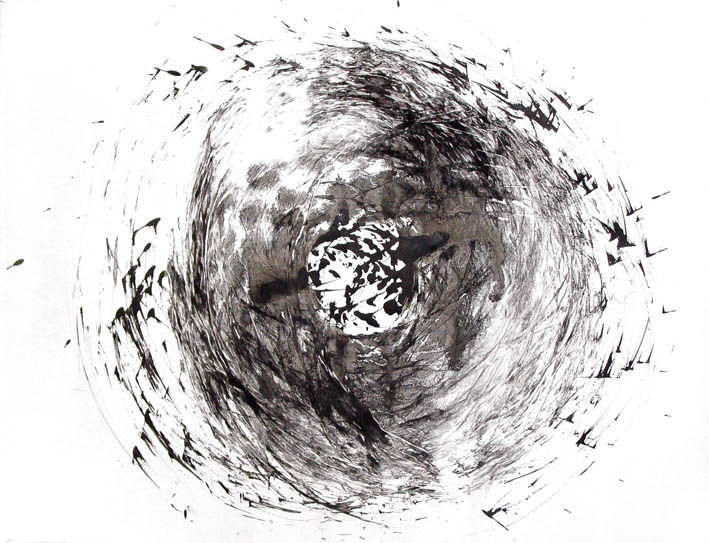
Wáng Bì 王弼 (226–249):
hànyǔ pīnyīn
視之不見名曰夷。
shì zhī bú jiàn míng yuē yí 。
聽之不聞名曰希。
tīng zhī bú wén míng yuē xī 。
摶之不得名曰微。
tuán zhī bú dé míng yuē wēi 。
此三者不可致詰,故混而為一。
cǐ sān zhě bú kě zhì jié ,gù hún ér wéi yī 。
其上不皦,其下不昧,
qí shàng bú jiǎo ,qí xià bú mèi ,
繩繩不可名,復歸於無物。
shéng shéng bú kě míng ,fù guī yú wú wù 。
是謂無狀之狀,無物之象,是謂惚恍。
shì wèi wú zhuàng zhī zhuàng ,wú wù zhī xiàng ,shì wèi hū huǎng 。
迎之不見其首,隨之不見其後。
yíng zhī bú jiàn qí shǒu ,suí zhī bú jiàn qí hòu 。
執古之道以御今之有。
zhí gǔ zhī dào yǐ yù jīn zhī yǒu 。
能知古始,是謂道紀。
néng zhī gǔ shǐ ,shì wèi dào jì 。
[ Because of Dào's namelessness and incomprehensibility in principle, without any way of intelligibility towards the transcendence of Dào, Lǎozĭ could have concluded "Whereof one cannot speak, thereon one must remain silent" [Wittgenstein].
[ Nevertheless he tries in several chapters to approach the unapproachable, to describe between the lines the indescribable: by means of a poetic approach, anticipating similar efforts of Negative Theology [e.g. Meister Eckhart].
01-06:
Look at it – nothing to see:
its name is plain (invisible);
listen for it – nothing to hear:
its name is empty (inaudible);
reach for it – nothing to grasp:
its name is subtle (intangible).
01-06 That which cannot be seen / heard / grasped, Wáng Bì calls *fine, inaudible, smooth:
"For these three [the senses of sight, hearing, and touch] it is impossible to come to a definition [of this], and thus, diffuse it is, [being] the One.
It is without shape or image, without sound or echo. That is why it is able to leave nothing unpenetrated and nothing unreached. It is not knowable and, even with my ear, eye, and touch I do not know to make a name [for it]." [*Wáng Bì 王弼 / Wagner].
Starting with this – 夷+微 interchanged in his commentary like in 馬王堆 Mǎwángduī A+B!), most translators abstracted from the literal meanings of yí-xī-wēi to invisibility, inaudibility, and intangibility as unidentifiable by way of three main senses.
Abel-Rémusat's JHWH = Jahveh hypothesis, mentioned by Hegel and discussed by von Strauß [1870 p. 61-75] in an ingenious fashion, was too farfetched in a sense! [h.a.].
The undefinable Dào, being the One, "leaves 'no-thing' unpenetrated and nothing unreached". [*].
07-12:
These three cannot be fathomed further –
hence, they merge and form a unity:
neither bright on top
nor dark below;
most boundless, and inconceivable,
returning home into Non-Being.
07-08 The single senses are limited: restricted to their specific qualities, they contribute their concrete aspects – as intermediate stages for higher conclusions about reality:
But when the senses merge to a bundle of little insights, they soar to a next level of abstraction, in order to take part in rational cognition on the long way to spiritual enlightenment.
09-12 "This One – its upper side is not bright; – its lower side is not dark. Dim is it and impossible to name.
It returns and relates [the entities] back to the 'no-thing'." [*].
On the ascent to higher realization, Yang (the sunny side of the hill) is not bright, Yin (its shadowy side) is not dark anymore.
Inconceivable, boundless, nameless: thus things and entities as temporary substances, follow the path home to 'no-thing' and non-entity, returning to Non-Being.
13-17:
This is called the shapeless' shape,
image of Non-Being;
called undifferentiated, incomprehensible:
Facing it, not to see its beginning,
following it, not to see its end.
13-15 "This [I] call the shape of the shapeless, the appearance of the 'no-thing'. One wishes to say that it does not exist? [The fact still remains] that the entities are based on it for their completion. One wants to say it exists? [The fact still remains] that it does not show its form. ... This [I] call undifferentiated and vague. That is, impossible to define." [*].
Approaching the Gate to the transcendent Dào again, the pale image of Non-Being radiates its shapeless shape.
Back to the undifferentiated beginning of the universe, forever unintelligible and incomprehensible, follows its last step of transfiguration into Absolute Nothingness.
16-17 Before and after, beginning and end, human being's pure form of intuition [Kant] vanish, and the creative Dào dreams of the next cycle.
18-21:
Hold on to antiquity's Dào,
thus mastering present's occurrences.
Can you understand antiquity's origin,
it is called Dào’s Golden Thread.
18-19 "Although antiquity and the present are different, their Way persists eternally. Only he who holds on to it is able to regulate the entities. 'Occurrence' means governmental business occurring." [*].
Beyond the Beyond, the sage (and the wise ruler) need an anchor in the past, to master the present, being enlightened by the insights of the ancients to cope with the affairs of Being: the burdens of daily life as well as the ruling the realm.
20-21 To understand the oldest beginning means to recognize the continuity of the Way.
"The featureless and nameless is the ancestor of the ten thousand kinds of entities. Although the present and antiquity are not the same, although times have changed and customs have changed, there definitely is no one [Sage Ruler] who has not based himself on this [featureless and nameless] by way of completing their regulated order. (...)
Although high antiquity is far away its Way still persists. That is why, although one is existing today, it is possible 'by means of this [present day reality] to cognize the oldest beginning." [*].
Consciousness needs remembrance, from high antiquity to the Here and Now, the anchor of Being and Time [Heidegger] is called Dào’s Golden Thread. 紀 jì means 'thread', then 'fabric', then the historical narrative... the 'fabric of world'. [following v. Strauß 1870 p. 78-79].
[
15 - The Inscrutability of the Wise Men
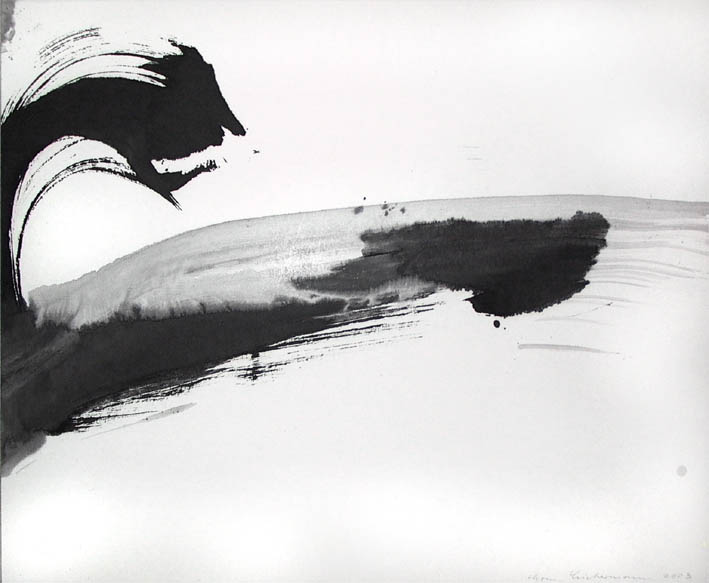
Wáng Bì 王弼 (226–249):
hànyǔ pīnyīn
古之善為士者,
gǔ zhī shàn wéi shì zhě ,
微妙玄通,深不可識。
wēi miào xuán tōng ,shēn bú kě shí 。
夫唯不可識,故強為之容。
fū wéi bú kě shí ,gù qiáng wéi zhī róng 。
豫兮[焉]若冬涉川;
yù xī [yān ] ruò dōng shè chuān ;
猶兮若畏四鄰;儼兮其若容;
yóu xī ruò wèi sì lín ;yǎn xī qí ruò róng ;
渙兮若冰之將釋;敦兮其若樸;
huàn xī ruò bīng zhī jiāng shì ;dūn xī qí ruò pǔ ;
曠兮其若谷;混兮其若濁;
kuàng xī qí ruò gǔ ;hún xī qí ruò zhuó ;
[澹兮其若海;飂兮若無止。]
[dàn xī qí ruò hǎi ;liù xī ruò wú zhǐ 。]
]孰能濁以[止]靜之徐清。
shú néng zhuó yǐ [zhǐ ]jìng zhī xú qīng 。
孰能安以動之徐生。
shú néng ān yǐ dòng zhī xú shēng 。
保此道者不欲盈。
bǎo cǐ dào zhě bú yù yíng 。
夫唯不盈故能蔽而新成。
fū wéi bú yíng gù néng bì ér xīn chéng 。
The deeper those ancient masters had penetrated into the mysteries of Dé and Dào, the further had they adopted their qualities: the manifest, obvious features and virtues of Dé as radiation of their Inner Power – as well as the hidden, obscure secrets of Dào as 'obnubilation' of their enlightenment.
01-05:
Antiquity's excellently practicing masters:
subtle, mysterious, and penetrating so deeply
impossible to comprehend.
Yet just for being inscrutable,
hence I strive for outlining their appearance.
01-05 Once again, the author of the Dàodéjīng tries to name the unnameable: to illuminate the unfathomable abyss of the transcendent Dào, as well as its reflection in the inscrutable masters of Antiquity, to outline them by allegories and metaphors with poetic license.
06-12:
Careful, oh, as if wading across a river in winter;
cautious like fearing neighbors on all sides;
courteous, like guests;
relenting, like ice that is going to melt;
genuine like uncarved wood,
vast like valleys, and
murky like muddy waters.
06-12 The mystical number of seven weak contours, three of them related to water again (!), gradually condense into a vivid inkling of an inexpressible impression.
[ "Someone crossing a [frozen] river in winter is hesitant about whether he should cross or not, and has an expression that makes it impossible to read his feelings." [* Wáng Bì / Wagner].
[ "If four neighbors join to attack the lord in the middle, he will be undecided, and one does not know which way he will turn. That in a person of 'highest receipt / capacity' [spoken of in Laozi 38.1] it is impossible to perceive any clues [in] his [expression] and it is impossible to make out [his] intentions is also like this". [*].
[ Formal like a guest, brittle like melting ice, genuine like an uncarved block, vast like a valley, murky like turbid water:
"Generally speaking, these 'they are like' all mean that one is incapable of [assigning a specific] shape and name to their countenance." [*].
The psychological dimension is noticeably hallmarked by an unnoticeable approach: delicately, and circumspect, the ancient sages trod their path.
A gentle course leads to a safe and secure way.
13-17:
Who is able to clear the turbid
by the wariness of silence,
or who is able to create calmness
by the wariness of enduring movement?*
Preserve such matters,
not to desire for abundance:
for only no excess can thus
shield you from continuous toil.
Who could be capable to (in spite of its being so difficult):
13-14 To treat the turbid – in a social situation or in oneself – that will need an application of the way of 無為 wú wéi: to let go with composure and circumspection, to attain transparency, and to reach the disentanglement by the sound of silence.
To treat the calmness – in myself or in a social situation – that will need an application of the way of 有為 yǒu wéi: to move with composure and circumspection, to attain liveliness, and to reach the disentanglement through the awakening of awareness.
15-17 Enshrine such methods, not to get overwhelmed by wishes, avoid excesses, exaggerations, and extremes (ch. 29).
Only not always filling up to the brim prevents from overflowing, thus to preserve entities from being forced continuously to toil.
[
16 - Returning to Constancy
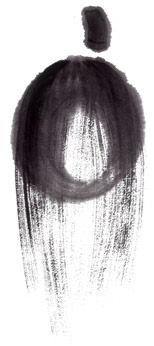
Wáng Bì 王弼 (226–249):
hànyǔ pīnyīn
致虛極守靜篤。
zhì xū jí shǒu jìng dǔ 。
萬物並作,吾以觀復。
wàn wù bìng zuò ,wú yǐ guān fù 。
夫物芸芸各復歸其根。
fū wù yún yún gè fù guī qí gēn 。
歸根曰靜,是謂復命;
guī gēn yuē jìng ,shì wèi fù mìng ;
復命曰常,知常曰明。
fù mìng yuē cháng ,zhī cháng yuē míng 。
不知常,妄作凶。
bú zhī cháng ,wàng zuò xiōng 。
知常容,容乃公,
zhī cháng róng ,róng nǎi gōng ,
公乃全,全乃天,
gōng nǎi quán ,quán nǎi tiān ,
天乃道,道乃久,沒身不殆。
tiān nǎi dào ,dào nǎi jiǔ ,méi shēn bú dài 。
Cyclic and eternal is the rhythm of Dào, growing and returning are the destiny of creatures: from contemplation to constancy, from reflection to release.
01-02:
Achieve emptiness in the ultimate,
keep calm in your core.
01-02 Utmost emptiness prepares truest tranquility, the enactment of non-action will dampen desire and achieve innermost calmness.
03-06:
All beings grow at once, but
I contemplate thereby their homecoming;
for creatures, divers and varied, though:
they all return home to their origins.
"The teaching of the eternal returning, from activity to inactivity, is the basic doctrine of Dàoísm" (Lin Yutang), s. ch. 25, 37, 40.
03-06 The perpetual cycle starts always and for 'every-thing' with the phase of growing towards the culmination of ripening.
The 24th hexagram of the Book of Change 易經 yì jīng, called 復 fù turning point, shows the Receptive Earth over the Rousing Thunder [51th].
Lǎozĭ, free of any desires (ch. 1), perceives from the beginning all subtlety and the mystery in the depths – all variety of entities, every single one amidst the myriads, will return: back to the roots, home to the origin, into the pivot of potentiality.
07-10:
Returning to the roots means calmness,
this is called return to destiny;
coming home to destiny means the Eternal,
aware of eternity means clear-sightedness.
For a chain of implications, the Dàodéjīng applies the Domino technique twice:
07-10 When the changeable things change over... to the calm anchor of Non-Being, it might be called the destiny of Being [Heidegger].
Coming home to destiny will forfeit the trappings of timeliness and the insignia of transiency, yet winning the constancy of the undesignated.
Having mirror-like [淮南子 Huái nán zi] knowledge of the eternal essence is called being enlightened, awareness of timelessness means clear-sightedness and embracing the encompassing [Jaspers].
11-17:
Not knowing eternity
rashly brings misery.
knowing eternity: being all-encompassing!
Being all-encompassing leads to impartiality,
impartiality leads to kingliness,
kingliness leads to Heavenliness,
Heavenliness leads to Dào.
11-12 The loss of knowledge of the eternal essence means: "evil penetrates into the allotted role" [Wáng Bì 王弼], in a chain reaction towards chaos and catastrophe.
13-17 After this brief warning, Laozi has a second positive Domino dialectics [Kalinke]: beginning with the consciousness of constancy, the sage or, respectively, the wise ruler will develop the psychological dimensions of ("leading to") ultimate tolerance, as well as impartiality, kingliness, and Heavenliness (kingly and heavenly statures) – leading at the end of all days to Dào.
18-19:
Dào leads to longevity:
the loss of the body is no threat!
18 Exceptionally,
[ Dào does not constitute here the "last word" in the chain of conclusions: Dào itself also leads to something...
[ They who fully penetrate to the ultimate emptiness and "negativity" – and attain the Eternal of entities (of the Way; ch. 52), they will ultimately not be exhaustible.
[ Hence, the Dào, since it ultimately cannot be exhausted, brings about longevity.
19 Avoiding several Christianized or poetically romanticized interpretations, 沒身不殆 mò shēn bù dài simply means: the end of our Self as person is no danger or threat – in light of returning: home to the root of nothingness, feeling secure in Dào.
More poetical: "Those who endure in Dào, will dive into the depth without danger." [Schwarz 1980 p. 66].
Cf. Lǎozĭ's variation in ch. 33: 死而不亡者壽 sǐ ér bù wáng zhě shòu = dying, yet no doom – longevity!
[
17 - Considerate Leadership
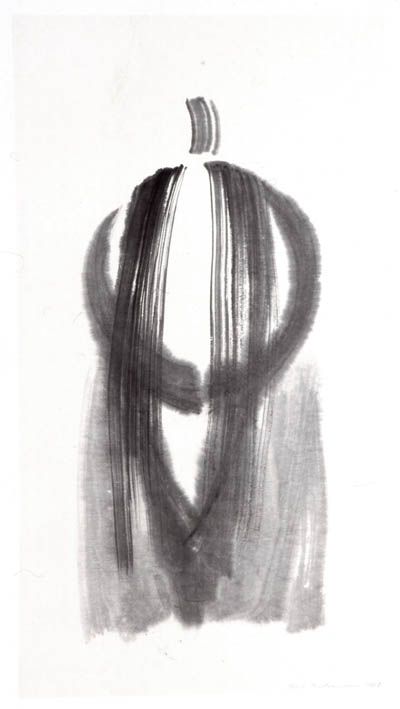
Wáng Bì 王弼 (226–249):
hànyǔ pīnyīn
太上,下知有之。
tài shàng ,xià zhī yǒu zhī 。
其次親而譽之。
qí cì qīn ér yù zhī 。
其次畏之。 其次侮之。
qí cì wèi zhī 。 qí cì wǔ zhī 。
信不足焉,有不信焉。
xìn bú zú yān ,yǒu bú xìn yān 。
悠兮其貴言,功成事遂,
yōu xī qí guì yán ,gōng chéng shì suí ,
百姓皆謂我自然。
bǎi xìng jiē wèi wǒ zì rán 。
Four kinds of rulers, the "highest on top", are ranked by their subjects' reactions:
01-04:
Highest on top: down here
they only know: they exist!
Their next highest are close and praised;
their next are feared;
their next are despised.
01-04 Rulers:
[ The greatest ruler let the subjects only know that he exists; because of his mature style of ruling lightly and unobtrusively in the background – leadership without interference 無為 wú wéi behind the scenes, and teaching without words – people feel free and self-confident in the absence of coercion: matters are brought about without being initiated by him [*Wáng Bì 王弼].
[ The second best to this ideal ruler is not able to rule without interference and with unspoken teaching, but he uses kindliness (like in ch. 38) and humaneness (ch. 17), combined with moral education; hence, he will already be perceived more: as close-by and praised.
[ The next ruler, ranked as third, lost the capacity of kindliness and humaneness, so he feels forced to use coercive measures, like the Legalists' deterrent: relying on "might and power" [Wagner], similar to 義 yì and 禮 lǐ (ch. 38).
[ The fourth and lowest rank will fall into disgrace and not be taken seriously anymore by his subjects: he rules by use of cunning and ruse; people try to circumvent him and not to follow his orders [*]; they learn, as well, guile, in order to evade the ruler and his regulations.
05:
Little trust to give,
little trust to get!
05 Where there is no trust, there is suspicion:
„Not trusting enough means not experiencing trust, right?”
When the full trust of ancient leaders in their subjects got lost, the subjects' doubts increased.
Trust, as a reciprocal, precious and subtle feeling of connection, can easily be destroyed, changing into the absence of all credibility, similar to 論語 Lún yǔ = Analects*
06-08:
Oh, circumspect noble words of the highest:
Tasks accomplished, affairs settled,
all other people say:
"We did it ourselves... spontaneously!"
06-08 Wise rulers' words, well-considered and true, precious and parsimonious, were not altered but followed, even if their intention could not be make out[*].
After tasks were achieved and works completed by unobtrusive non-interference, then people interpreted everything as natural and spontaneous, as if done by themselves!
[
18 - The Omen of Decay
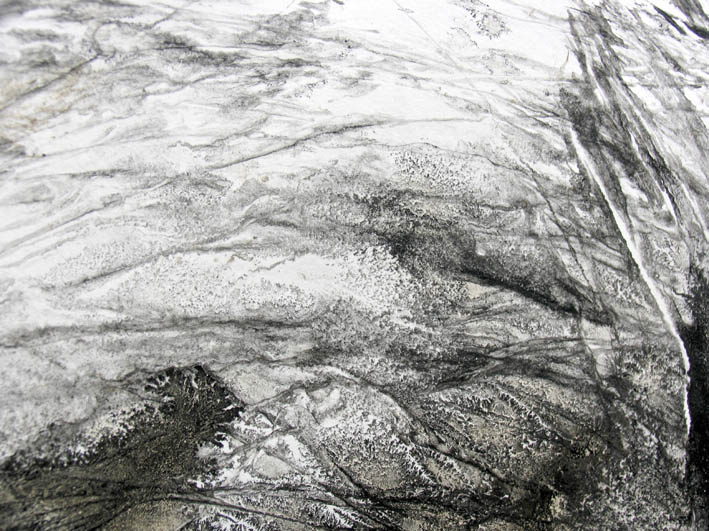
Wáng Bì 王弼 (226–249):
hànyǔ pīnyīn
大道廢有仁義;
dà dào fèi yǒu rén yì ;
慧智出有大偽;
huì zhì chū yǒu dà wěi ;
六親不和有孝慈;
liù qīn bú hé yǒu xiào cí ;
國家昏亂有忠臣。
guó jiā hūn luàn yǒu zhōng chén 。
The break in symmetry of the primordial Dào had started the evolution of things in the physical universe, as well as, later on, the differentiation of values in the social world.
01-02:
Great Dào abandoned:
humaneness and righteousness emerge.
Shrewdness and sophistry arise:
there is great hypocrisy.
01 This loss of original harmony, this paradise of "nobody wants anything" [河上公 Héshàng Gōng], leads firstly to "positive" attempts to compensate: idealized systems of values and formal regimentations of social behavior as Confucian 仁 rén humaneness or benevolence and 禮 lǐ ritual or ceremony.
The circular Dào reprobates to rectilinear rectitude or righteousness [Abbot], concerning civilization and culture. Beauty and ugliness originate from the same source (ch. 2) ...
02 More and more forced compliance leads, secondly, to competitive usage of intelligence: in close relations as cunning and ruse.
Compulsory participation will give rise to counter-movements and evasive strategies within society, the usage of wisdom will degenerate into sophistry and hypocrisy.
03-04:
Close relatives not harmonizing,
filial piety and paternal benevolence come up.
Are land and folk in confusion and chaos,
loyal patriots appear.
03 Already inside the social core unit of the family, corresponding patters determine the role behaviour of the basic relationships (father and son, older and younger brother, husband and wife).
This will be euphemistically expressed as piety and benevolence, embedded in rites and constraints.
04 At the summit of the state, the renunciation of the Dào will all the more so result in the loss the art of leadership without interference and in the moral confusion of the ruler.
Hence, to avoid chaos, he will adopt desperate measures to force law and order; thereby, the ruler's surveillance apparatus and the subsequent evasive behaviour of the subjects [Wagner] form a never-ending spiral.
Artificial conceptions of devotion arise, followed by a veritable army of officials and sycophants, who finally end up spying out each other with mutual distrust.
[
19 - Freedom through Modesty
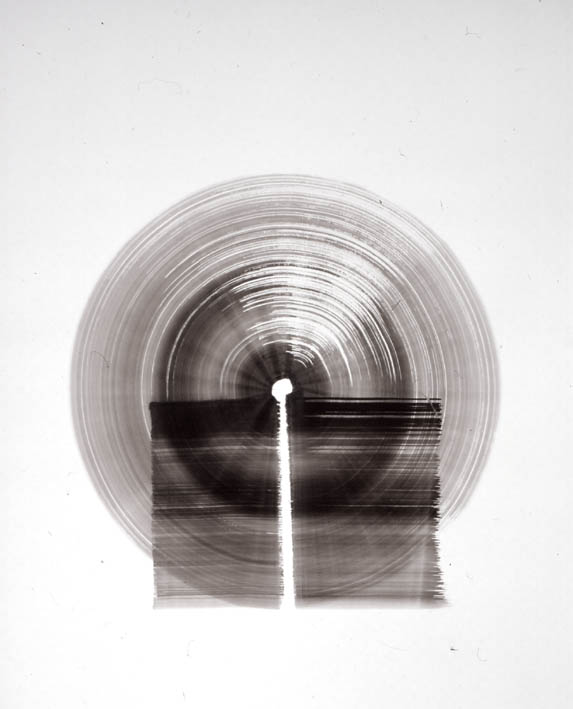
Wáng Bì 王弼 (226–249):
hànyǔ pīnyīn
絕聖棄智,民利百倍;
jué shèng qì zhì ,mín lì bǎi bèi ;
絕仁棄義,民復孝慈;
jué rén qì yì ,mín fù xiào cí ;
絕巧棄利,盜賊無有;
jué qiǎo qì lì ,dào zéi wú yǒu ;
此三者,以為文不足。
cǐ sān zhě ,yǐ wéi wén bú zú 。
故令有所屬,
gù lìng yǒu suǒ shǔ ,
見素抱樸少私寡欲。
jiàn sù bào pǔ shǎo sī guǎ yù 。
The, at first glance, surprisingly uncompromising demands in ch. 19 are easier to understand as:
[ continuation of and unity with ch. 18 (and 20.1.);
[ ironic and consistent criticism of Confucian values, unmasking their renunciation of the Dào of Nature;
[ direct recommendations primarily to the ruler on how to bring people back to naturalness, simplicity, and genuineness (as continued in ch. 20, 22, 23, 28, 37, 38, 39, 80).
01-06:
Renounce sanctuaries,
discard bookishness:
people benefit a hundredfold.
Abandon benevolence,
reject righteousness:
people return to true filial piety
and parental love.
Renounce craftiness,
reject profit:
no robbers and thieves will exist anymore.
01-02 The pseudo-wisdom of a selfish ruler and a dominant class: their sanctimoniousness, cunning, and erudition must be abolished for the true wisdom of "Holy Simplicity".
Let the people rediscover the manifold of benefits of living their Dè: the Inner Power of innocent simplicity 樸 pǔ instead of competitiveness 爭 zhēng – “Blessed are the meek, for they will inherit the earth” (Matthew 5:5).
03-04 In social life, accordingly, the way from pseudo-culture back to Nature and naturalness [Rousseau, Thoreau] has to repudiate the social surrogate values:
Humaneness 仁 rén in favor of unselfish love 愛 ài, and moral rectitude 義 yì in favor of true, genuine, and spontaneous piety and love – without the detour of rites and ceremonies.
05-06 In daily practical and economic life, consequently, the sovereign has to discard cunning and ruse 巧 qiǎo and fierce competition and pure lust for profit 利 lì, to lead all subjects to cooperativeness and ethical consumerism again.
Taking advantage of one's fellow human beings by way of "legal" business will disappear, lost in meaninglessness, as will direct forms of theft, robbery and fraud.
07-11:
These three examples are insufficient
to consider a full depiction,
hence, let them have this addition:
Appear plain,
hold nativeness,
reduce selfishness,
diminish desires!
Abandon scholarship:
no worries anymore.
"With these three abolishments you may think that culture will be insufficient" [Karlgren].
07-08 In light of the significance of these threefold basics as crucial for living the spirit of Dào, Lǎozĭ adds some further illustrations:
09
Appear without pretensions 素 sù: manifest simplicity,
maintain nativeness 樸 pǔ: value the unadorned.
10
Reduce selfishness 私 sī: minimize interests,
curb desires 欲 yù: diminish greed.
11*
Abandon punditry 學 xué: stop bookish erudition,
no worries 憂 yōu: without fear.
[
20 - Profane Men and Wise Man
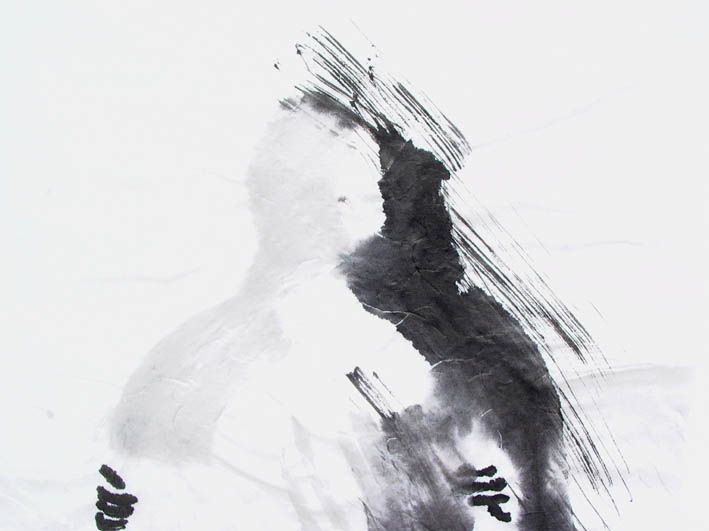
Wáng Bì 王弼 (226–249):
hànyǔ pīnyīn
絕學無憂,唯之與阿,相去幾何﹖
jué xué wú yōu ,wéi zhī yǔ ā ,xiàng qù jǐ hé ﹖
善之與惡,相去若何﹖
shàn zhī yǔ è ,xiàng qù ruò hé ﹖
人之所畏,不可不畏。
rén zhī suǒ wèi ,bú kě bú wèi 。
荒兮其未央哉!
huāng xī qí wèi yāng zāi !
眾人熙熙如享太牢 如春登臺。
zhòng rén xī xī rú xiǎng tài láo rú chūn dēng tái 。
我獨泊兮其未兆,如嬰兒之未孩;
wǒ dú bó xī qí wèi zhào ,rú yīng ér zhī wèi hái ;
儽儽兮若無所歸。
lěi lěi xī ruò wú suǒ guī 。
眾人皆有餘,而我獨若遺。
zhòng rén jiē yǒu yú ,ér wǒ dú ruò yí 。
我愚人之心也哉!
wǒ yú rén zhī xīn yě zāi !
沌沌兮俗人昭昭。
dùn dùn xī sú rén zhāo zhāo 。
我獨昏昏;俗人察察,我獨悶悶。
wǒ dú hūn hūn ;sú rén chá chá ,wǒ dú mèn mèn 。
澹兮其若海,飂兮若無止眾人皆有以,
dàn xī qí ruò hǎi ,liù xī ruò wú zhǐ zhòng rén jiē yǒu yǐ ,
而我獨頑且鄙。
ér wǒ dú wán qiě bǐ 。
我獨異於人,而貴食母。
wǒ dú yì yú rén ,ér guì shí mǔ 。
[ With 28 lines the longest of all chapters – and the most personal one with 7 我 wǒ (!):
[ 09-28 was called "The first Emotional Prose of Chinese literature" [Shen], whether it be a self-portrait [Ellen Chen] or not [Waley; Duyvendak].
Prose, full of ancient poesy!
01-05:
Abandon scholarship: no worries!
Approval and its difference to flattery:
how far mutually apart, eh?
Good and its difference to evil:
similarly mutually apart, what?
01 Abandon punditry 學 xué, stop bookish erudition: carefree 憂 yōu, without fear. [= 19.11.].
"If I were hitting the mark without knowledge, why should [I] strive for an enhancement [of my knowledge]?" [* Wáng Bì 王弼 / Wagner].
02-03 True agreement or hypocritic flattery, or yes & yes, Sir! or by son & by daughter [v. Strauß]: similar, and yet possibly very different!
Mǎwángduī 馬王堆: to shout angrily 訶, or to scold while laughing 呵; not in Guōdiàn 郭店, but in 北大 Běi Dà 何 how? or why?
04-05 Are Good 善 & Evil 惡, as clear opposites, more distant or similar to 唯 & 阿?! asks Lǎozĭ in Sokratic style.
Considering that opposites come from the same source (ch. 2) and Heraclitus's enantiodromia is valid as a principle for all yīn & yáng 陰 陽, from a Dàoist point of view, opposites are no implacable enemies, but rather complementary siblings in the womb of the One.
Even more depending on context and also intention, 唯 & 阿 can be similarly separated from each other – "yea and aye"!
06-08:
People, fearing something,
cannot elude fear:
loneliness, not yet ending, indeed!
06-08 Human fellows share the same, inevitable patterns of fear; of being praised & of suffering [*], first and foremost of self-renunciation [v. Strauß].
Deserted and alone, one still feels endlessly distant to the ordinary ones:
"'Deserted [I am], endlessly!' He is sighing about the distance separating him from the vulgar."
09-11:
Most people are merry and jolly,
as if revelling great sacrificial feasts
and ascending view terraces in springtime.
09-11 Sacrifices of a big ox were reserved for the upper ranks only.
Ordinary people enjoy their superficial hedonism, as if, on a big festival or on a delightful panoramic terrace, their view was from a great height – yet their insight was not deep.
Waley also quotes special "Springtime Terrace Plays" (promoting the fertility of the crops).
Wáng Bì: "Tailao sacrifice": "'The vulgar scholars are excited as if performing the Tailao sacrifice, as if going up a terrace in spring.' The vulgar scholars are beguiled by beauty and promotion, bedazzled by glory and profits. Their desires press ahead, their hearts are in competition."
[* p. 184]. Cf. 莊子 Zhuāng zǐ, ch. 19 "The Full Understanding of Life" [James Legge]! [h.a.].
12-14:
I alone... am quiet, alas,
so still without any omen,
like an nursling, not yet smiling;
worn and weary, alas,
like without any place to return to.
12-14 First "I" of seven here, and three statements about missing something:
[ alone and abandoned, as if otiose, and still without a sign, as if without destiny of being [Heidegger];
[ like a newborn, as if what to smile about has not yet predetermined;
[ helpless and aimless, as if without return to the soil, ubiquitary like the Dào: "everywhere and no-where" [Ellen Chen].
15-18:
Most people, they all have in abundance,
yet only I seem left behind.
I am also a simpleton's heart, indeed –
murky and confused, alas.
We follow now his subjective view:
15-16 Quite a few of those ordinary people seem to live in opulence, enjoying their plethora of superfluous things, "filling their chests and hearts to overflowing" [*] – yet I alone seem lagging behind, without their concerns and desires, as though I had lost them.
17-18 As the indifferent dimwit that I am, lackadaisical and undecided, my heart is turbid and confused, I have no ambition (to prefabricated fulfillment).
19-24:
Common people are bright and clear,
I alone am dim and darkened;
common people: strict and discerning,
I alone am dull and distracted.
I am surging, alas, such like the sea,
drifting, alas, like without any destination.
19-20 The ordinary folk are slight and luminous, and they let their light shine forth (as opposed to the sage, who is enlightened but does not investigate; ch. 58).
21-22 Normal people are so alert and discriminating: they investigate and differentiate (but also separate) – I seem to be dark and dull, opaque and obscure.
23-24 Undulating and turbulent like the sea, are my "feelings impossible to make out" [*].
I seem to be drifting without stability, without commitment: "like the high winds I never stop" [Chen].
25-28:
Most people, they all have clear motives,
but I alone am headstrong
like a backwoodsman.
I alone am different from other people –
but I cherish... the Nurturing Mother!
25-26 Everyone has a clear motive, normal people handle their affairs in a well-considered fashion, yet I seem to be obtuse and solitary, stolid and stupid, backwards and behind the times.
27-28 And now, after a long poetical preparation, Lǎozĭ drops a bombshell of ultimate irony: a unique rhetorical masterpiece – to disclosure the depth under the surface, the wisdom behind the philosophical curtain:
[ I alone desire to be different to the ordinary people... in that I honor the Nourishing Mother!
[ So, to express his estimation of the Dào, Lǎozĭ ("the Old Child", "the honorable old Master") uses here the metaphor of a nursing infant, who gives preference to his "wet nurse", while scorning the pleasures of all the others.
[ Those people esteem phantasmagoria, "the dazzle of worldly accoutrements" [*] – but wise men honor the nursing, nurturing, nourishing mother, the root of all life: Dào.
[
21 - Unfathomable Dào
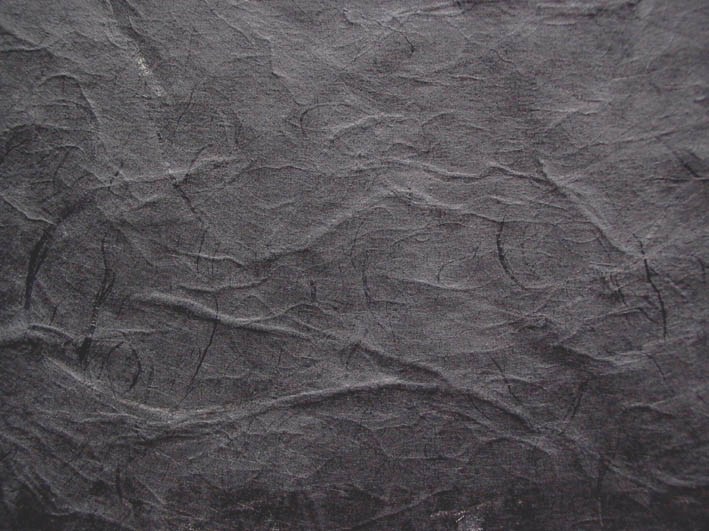
Wáng Bì 王弼 (226–249):
hànyǔ pīnyīn
孔德之容惟道是從。
kǒng dé zhī róng wéi dào shì cóng 。
道之為物惟恍惟惚。
dào zhī wéi wù wéi huǎng wéi hū 。
惚兮恍兮其中有象。
hū xī huǎng xī qí zhōng yǒu xiàng 。
恍兮惚兮其中有物。
huǎng xī hū xī qí zhōng yǒu wù 。
窈兮冥兮其中有精。
yǎo xī míng xī qí zhōng yǒu jīng 。
其精甚真。其中有信。
qí jīng shèn zhēn 。qí zhōng yǒu xìn 。
自古及今,其名不去以閱眾甫。
zì gǔ jí jīn ,qí míng bú qù yǐ yuè zhòng fǔ 。
吾何以知眾甫之狀哉!以此。
wú hé yǐ zhī zhòng fǔ zhī zhuàng zāi !yǐ cǐ 。
[ In this chapter, Lǎozĭ tries once more to describe the undescribable, using the poetical power of the vacuum between the lines, as well as – methodologically – the insight of intuition.
[ The Dàodéjīng offers in this chapter not less than a creative theory of creation from Nothingness to Being!
01-02:
The attitude of purest Inner Power
follows only Dào.
01-02 Here, the Dàodéjīng prepares a logical step-ladder, for approaching the "time before time", and tracing 德 Dè back to the pure potentiality of 道 Dào.
Inner Power's disposition (attitude) toward the true emptiness is crucial for one's capacity to act only in accordance with the Way of 道.
"The grandest forms of active force
From Tao come, their only source" [Legge].
("Als Quelle nur des Dàos Norm,
Bringt Innere Kraft zu höchster Form"; h.a.).
03-12:
In its acting as entity Dào
remains only indistinct and elusive;
Elusive and indistinct, alas,
are there images inside it;
indistinct and elusive, alas,
there are already beings indicated inside it;
secluded and unfathomably, alas:
in its inside, there are essences:
these are utmost genuine:
in its inside there is truthfulness.
The content of the following poetical paraphrases reminded many translators and commentators (though only partially!) of Plato's doctrine of forms.
03-04 Dào's acting (not on, but) as an entity [Wagner p. 443]: figurative, symbolic, metaphorical expressions, "vague" = shapeless, "diffuse" = unfettered, free [we follow now mainly 王弼 Wáng Bì].
05-08 Diffuse and vague, elusive and indistinct, alas, are there images that exist therein;
[ vague and diffuse, indistinct and elusive, are there beings that exist therein.
[ The beings are initiated by Dào's shapelessness, completed by its unlimitedness.
[ But the ten thousand entities are not aware why they are initiated and brought to completion.
[ The process from originally vague and shapeless images inside (the Dào) toward things and beings outside in the universe that is a sort of creative imagination of creation (!): from absolute emptiness to potential (ideas of) images to being in space-time.
09-10 Secluded and distant, deep and unfathomable, alas, inside there are essences.
"Secluded" and "distant", 王弼 Wáng Bì calls sighs: on account of their depth and abstruseness: not directly to perceive, albeit the ten thousand kinds of beings are based on these essences.
But there is hope: by determining their true nature (the Dào!), it becomes possible to perceive the entities indirectly, and thus, the Way becomes indirectly discernible through them – at least in some aspects of their "seed", which is present in the ten thousand kinds of entities! [Wagner, p. 443].
11-12 Because these essences are in fact truthful, there is credibility (credible evidence) inside.
When the entities have related back to the phase of "secluded" and "distant", their utmost true essence is understood, and the nature of the myriads of kinds is determined; trustworthiness becomes trust.
13-17:
From ancient times until today,
its name has been unforgotten,
for one discerns
all being's primordial beginning.
How do I know this all being's beginning?
Intuitively!
13-15 Because the ultimate absolute truth cannot be understood by a name, therefore is its (unforgotten) name called... namelessname!
In this name one discerns the primordial beginning of all entities; from ancient times to the present, everything occurred on the basis of this namelessness.
16-17 Finally, Lǎozĭ seems to be asked, how he can know anything about the features of the myriads of beings in the beginning, when obviously there is no direct experience about "Absolute Negativity" [Hegel] and the early periods of pure potentiality?
"From this", "for this reason": All the abovesaid has been obtained – merely from the insights of intuition.
[
22 - The Wisdom of Yieldingness
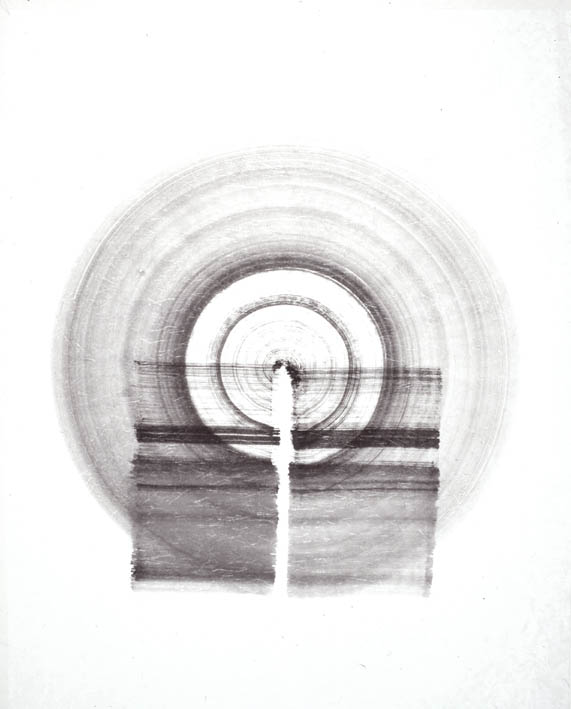
Wáng Bì 王弼 (226–249):
hànyǔ pīnyīn
曲則全, 枉則直,
qǔ zé quán , wǎng zé zhí ,
窪則盈,敝則新少則得,
wā zé yíng ,bì zé xīn shǎo zé dé ,
多則惑。是以聖人抱一,為天下式。
duō zé huò 。shì yǐ shèng rén bào yī ,wéi tiān xià shì 。
不自見故明;不自是故彰;
bú zì jiàn gù míng ;bú zì shì gù zhāng ;
不自伐故有功;不自矜故長;
bú zì fá gù yǒu gōng ;bú zì jīn gù zhǎng ;
夫唯不爭,故天下莫能與之爭。
fū wéi bú zhēng ,gù tiān xià mò néng yǔ zhī zhēng 。
古之所謂:「曲則全者」豈虛言哉!
gǔ zhī suǒ wèi :「qǔ zé quán zhě 」qǐ xū yán zāi !
誠全而歸之。
chéng quán ér guī zhī 。
"True words sound paradoxical..." (ch. 78): using the might and power of paradoxes provides us insight into the dynamics of development, as well as into the unity of opposites.
01-06:
Partial, then complete,
crooked, then straight;
empty, then filled,
worn out, then new.
Having little, then obtaining much –
yet too much, then confused!
Quotes of ancient aphoristic sayings, with their "balancing wisdom" [LaFargue] prepare the way for the application by a wise ruler.
Wáng Bì 王弼 correlates 01-04 to 09-16(!), as follows:
01-04 Maxims:
[ First maxim of the sages: fragments build a whole, even when they at first hide the results in the completed form: without showing themselves, they become complete (in their enlightenment).
[ Second maxim of the sages: thus bending results toward correctness, and doing so without self-righteousness, their being right shines forth.
[ Third maxim of the sages: a depression (in a riverbed) will be filled, without bragging their achievements will therefore be uncontested.
[ Fourth maxim of the sages: that which is worn out leads to something new, thus, without praising themselves, their capacity grows.
05-06 From four points of view on quality, the quantitative power of paradoxes are disclosed in the most incisive fashion: "Reduction results in attaining, increase results in delusion"!
For clarification, Wáng Bì 王弼 makes use of the metaphor of a tree: the higher the top of a tree, the further away it is from its root, the lower it is, however, the better it preserves the root...
Reducing allows the root to be preserved; increasing means: further away from one's true nature, hence in confused delusion.
07-18:
Hence: wise men keep to the Oneness,
and set an example for all world:
Not self-attentive,
therefore enlightened;
not self-righteous,
therefore prominent;
not self-faming,
therefore meritorious;
not self-admiring,
therefore enduring.
Just for not competing,
nobody worldwide can
compete with them.
07-08 These elucidations in all its qualitative and quantitative facets are now to be transferred to the ruling of an ideal leader: when they are able to embrace the One and cherish the unity of opposites, then they can be regarded as examples, then they can act als wise rulers, making the empire exemplary.
09-16 Wáng Bì's 王弼 abovementioned four maxims of not being
[ self-involved,
[ self-righteous,
[ self-praising, and
[ self-admiring
lead wise rulers to enlightenment, prominence, and merit, as well as to endurance and constancy.
17-18 Acting by non-acting, the humility of non-interference, the high art of non-competing (ch. 73) allow leaders to lead by not leading: unobtrusive and almost unnoticed, their subjects enjoy self-regulation and peace.
Only because sages never compete, nobody can enter in competition with them (pacifism)!
"Negative Morality", defined by what is not to do, can have positive goals and objectives, being reminiscent of the Sermon of the Mount [Wing-tsit Chan].
19-21:
The ancient's saying:
'Partial, then complete':
How could that be idle talk, indeed?
Truly, whole...
they return to Dào.
19-21 The quotes of ancient times are confirmed again: Lǎozĭ asks rhetorically, if From the Part to the Whole and the other examples could be mere empty words?
Because of their true, genuine wholeness, all entities (leaders and subjects) will return home, back to their roots, embracing the Oneness, home into the womb of Dào.
The Dào as a tool: like a compass, the Great One "observes the destiny under Heaven" [Ren, 1993].
[
23 - The Sustainability of Dào
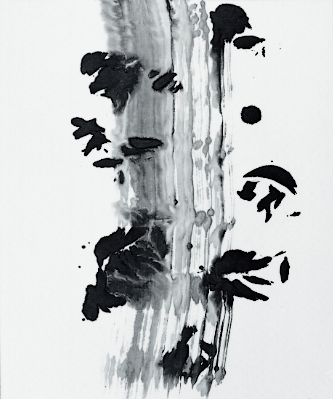
Wáng Bì 王弼 (226–249):
hànyǔ pīnyīn
希言自然。
xī yán zì rán 。
故飄風不終朝,驟雨不終日。
gù piāo fēng bú zhōng cháo ,zhòu yǔ bú zhōng rì 。
孰為此者﹖天地。
shú wéi cǐ zhě ﹖tiān dì 。
天地尚不能久,而況於人乎﹖
tiān dì shàng bú néng jiǔ ,ér kuàng yú rén hū ﹖
故從事於道者,同於道。
gù cóng shì yú dào zhě ,tóng yú dào 。
德者同於德。
dé zhě tóng yú dé 。
失者同於失。
shī zhě tóng yú shī 。
同於道者道亦樂得之;
tóng yú dào zhě dào yì lè dé zhī ;
同於德者德亦樂得之;
tóng yú dé zhě dé yì lè dé zhī ;
同於失者失於樂得之。
tóng yú shī zhě shī yú lè dé zhī 。
信不足焉有不信焉
xìn bú zú yān yǒu bú xìn yān
Both nature's way of self-regulation and the naturally way of following one's inner truth display similar wordless sustainability.
With Dào, with Dé?!
Attaining or losing them?!
01-07:
To make few words – Nature's way.
So, neither whirlwinds last all morning,
nor downpours last all day.
Who makes these things?
Heaven and Earth!
Even Heaven and Earth
not able to duration,
so the less do humans, eh?
01 Words about the Way are stale and bland (ch. 35), hence, Nature's ultimate clues are inaudible (ch. 14).
"Many words frequently exhaust themselves" (ch. 5): talking on and on about something inhibits, death will inhibit things, spontaneity releases.
02-03 Like all extremes, cyclones and cloudbursts are not enduring:
"Sunrise doesn't last all morning,
A cloudburst doesn't last all day..."
[Beatles].
"Nothing is as constant as change" [Heraclitus], the constancy of the universe is called evolution!
04-07 If even the initiators of those violent outbreaks, Heaven and Earth, are subject to this Law of Change, how could then human beings be capable of maintaining "an interfering government for long" [*Wáng Bì 王弼 / Wagner].
08-11:
Therefore pursue affairs by Dào:
those who follow Dào,
become one with Dào;
those who follow Inner Power,
become one with Inner Power;
those who follow Losing both,
become one with Loss.
08-09 Hence, wise men (and rulers) manage their affairs in accordance with the Dào – because all beings are completed by the Dào's shapeless and non-interfering guidance (ch. 02) and its wordless, "unspoken" teaching.
It thereby leaves all other beings their true nature [*]. [*Wáng Bì 王弼].
Those who follow the sage's example, practicing the Dào, will become substantially identical with it.
10-11 Those who attain the Dào [their root, 'true nature'; ch. 22] – by following their Inner Power! – i.e. by reducing they attain their root (ch. 22), will become substantially identical with attaining (and with their Inner Power!).
Correspondingly, those who lose the Dào (and their root by increasing), will become substantially identical with the loss.
12-17:
Those one with Dào:
Dào also gladly attains them;
those one with Inner Power:
Inner Power also gladly attains them;
those one with Losing Dào:
Loss also gladly attains them.
12-13 Those followers who are now identical with Dào will, so to speak, be 'gladly' incorporated and adopted by it, ..
Dào will "move towards them, promote and complete their striving, and it will be glad to preserve them" [von Strauß].
14-15 Those now identical with the personification of attaining Dào (by Inner Power), will be 'gladly' incorporated and adopted by attaining (Inner Power).
16-17 Those now identical with the personification of the loss of Dào (by no Inner Power), will be gladly incorporated and adopted by the loss (of Dào and Dé!).
Wáng Bì's commentary "This means: He adapts to their practice. That is why he makes [them] identical with [the Way, attainment, or loss] by way of corresponding to them." ...is 'unsatisfactory' in Wagner's view:
"He adapts to their practice..." is not the typical way of "a more explicit language in which most of the original textual ingredients are still visible." etc. [Wagner 2003 p. 445-446].
18:
Little trust to give,
little trust to get!
18 'Where there is no trust, there is suspicion.'
Like already in ch. 5, there referring more to the relationship between ruler and subject, here more in general:
„Not trusting enough means not experiencing trust, right?”
When full trust of ancient leaders in their subjects got lost, subjects' doubts increased.
Trust, as a reciprocal, precious and sensitive feeling of connection, can easily be destroyed, changing to the absence of all credibility.
[
24 - Avoidance of Sophistication
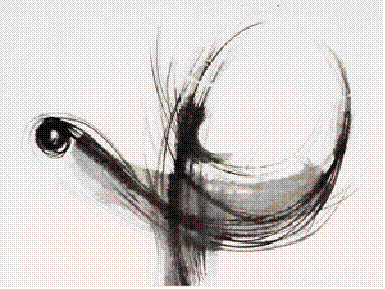
Wáng Bì 王弼 (226–249):
hànyǔ pīnyīn
企者不立;跨者不行。
qǐ zhě bú lì ;kuà zhě bú háng 。
自見者不明;自是者不彰。
zì jiàn zhě bú míng ;zì shì zhě bú zhāng 。
自伐者無功;自矜者不長。
zì fá zhě wú gōng ;zì jīn zhě bú zhǎng 。
其在道也曰:餘食贅形。
qí zài dào yě yuē :yú shí zhuì xíng 。
物或惡之,故有道者不處。
wù huò è zhī ,gù yǒu dào zhě bú chù 。
Partially drawing on ch. 22, the Dàodéjīng is here exposing unnatural traits and turgid behavior in the light of the Dào.
01-06:
On tiptoes you do not stand,
with stilted steps you do not walk.
Self-attentive ones do not become enlightened,
self-righteous ones do not shine forth.
Self-boasting ones are without merits,
self-praising ones do not outlast.
01-02 Two new examples of supposed self-aggrandizement are introduced before the examples already known from ch. 22:
Factitious attempts to snatch a higher rank or a more advanced position are doomed to failure:
A ruler "who takes a high stand will not stand [firmly]. The other entities [his subjects] will [, as a consequence of his example,] think such of [their own] advancement and consequently make [him] lose [his] security." [*Wáng Bì 王弼 / Wagner].
A ruler "who makes great strides will not make headway", [A ruler] who shows himself does not become enlightened. [A ruler] who is self-righteous will not have [his being right] shine forth. [A ruler] who brags will not have [his] achievements [uncontestedly]. [A ruler] who praises himself will not have [his capacity] grow. With regard to the Way I call these [attitudes] 'left-over food' and 'super-fluous actions.'" [*].
03-06 These lines 24.03.-24.06. are formally almost perfect inversions of the content in the (pairs of) lines 22.09.-22.16., with respectively 者 zhě in lieu of 故 gù – plus 24.05. 無 wú for 22.14. 有 yǒu, of course!
Mǎwángduī 馬王堆 A+B logically put ch. 24 between 21 and 23.
In ch. 22 Lǎozĭ shows, how not having negative traits like self-satisfied, self-righteous, self-praising, self-admiring leads to the positive consequences: enlightened, prominent, meritorious, enduring.
Here the 'Old Master' demonstrates inversely how having those negative traits leads to not having the same positive traits!
07-10:
This, with regard to Dào, too, means:
excessive food, turgid behavior –
creatures might detest that,
therefore Dào followers do not linger there.
07-10 The more abstract recommendations in ch. 29, to avoid excesses, exaggerations, and extremes, are here elucidated as conclusions of the above-mentioned correlations – in light of Dào:
Vain, presumptuous, pushy, turgid behavior is revolting... like leftover food: basically good, but in the meanwhile rotten.
All creatures disdain superfluous, overdone conduct as excessive excrescences.
[
25 - The Greatness of Dào
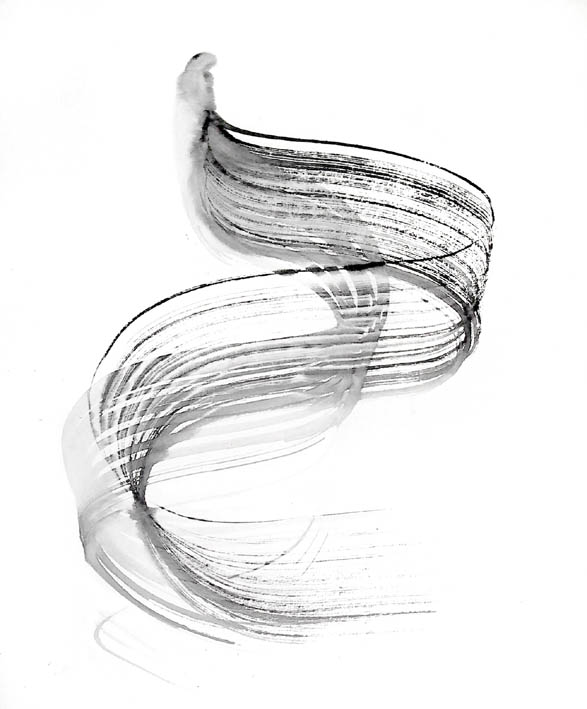
Wáng Bì 王弼 (226–249):
hànyǔ pīnyīn
有物混成先天地生。
yǒu wù hún chéng xiān tiān dì shēng 。
寂兮寥兮獨立不改,
jì xī liáo xī dú lì bú gǎi ,
周行而不殆,可以為天下母。
zhōu háng ér bú dài ,kě yǐ wéi tiān xià mǔ 。
吾不知其名,強字之曰道。
wú bú zhī qí míng ,qiáng zì zhī yuē dào 。
強為之名曰大。
qiáng wéi zhī míng yuē dà 。
大曰逝,逝曰遠,遠曰反。
dà yuē shì ,shì yuē yuǎn ,yuǎn yuē fǎn 。
故道大、天大、地大、人亦大。
gù dào dà 、tiān dà 、dì dà 、rén yì dà 。
域中有四大,而人居其一焉。
yù zhōng yǒu sì dà ,ér rén jū qí yī yān 。
人法地,地法天,天法道,道法自然
rén fǎ dì ,dì fǎ tiān ,tiān fǎ dào ,dào fǎ zì rán
Once more one of those chapters... where Lǎozĭ tries to explore the unexplorable, to designate the unnamable, to reveal the ephemeral.
[ In ch. 14, he uses negative considerations, to approach the Pure Intuition.
[ In ch. 21, we find his visionary providence poetically between the lines.
[ In ch. 25, the way to the Substantiality of the Absolute is paved with the power of poesy and aesthetic contemplation.
01-05:
There was an entity,
nebulous and perfect,
born before
Heaven and Earth.
Silent and void, alas,
unique and unalterable,
universally circulating,
yet inexhaustible:
so it might be regarded as
world's Primal Mother.
01-02 In the "Axial Age" [Jaspers, 1949, following Anquetil-Duperron, 1771, v. Strauß, 1859(!) & v. Lasoulx, 1870], philosophy emerged in several advanced civilizations independently from each other, "thus spoke": Zarathustra, Confucius, Lǎozĭ, Buddha, the Prophets, and the Pre-Socrates.
In the "mythological-evolutionary" cosmogony of the Dàodéjīng, on the shoulders of creation myths, the ultimate beginning vanishing into the fog of that period before becoming the Primal Mother of Heaven and Earth, via the perfect symmetry of the grand unification, back to the original chaos of formless form, the unavoidable void of Non-Beingness and into the transcendence of the Absolute Nothingness.
03-05 *Wáng Bì 王弼 elucidates Lǎozĭ's adjectives:
[ Vacant: and still is Dào, "without form and substance";
[ alone: "no other beings' companion";
[ unchanging: "never losing its eternal essence";
[ traveling: all around to every place, "but evades all danger".
Hence: Dào is "the mother of Heaven and Earth", able to keep intact its "grand shape" [*Wagner, p. 201+448].
06-08:
I do not know its name;
to designate it, I call it Dào;
forced to give it a name,
I call it great.
06-08 There can be no timeless name for Dào (ch. 01):
[ To define its shape, because any transcendent inconceivable something "comes to completion out of the diffuse" and is "without form" (ch. 41)
[ A temporary name of practical purposes and as a stop-gap measure, a mere designation... shall be Way (Dào), because "there is no being which is not based on it".
[ To indicate a first impression of its nature, essence, and substance, a (forced) second designation... shall be Great. ("Passing through": no place to which it does not have access).
09-11:
Great means traveling,
traveling means far-reaching,
far-reaching means returning.
09-11 Meanings:
[ Great means "passing through" (traveling): not fixed to one substance only, there is no place to which is does not get [*]:
[ Passing through means to get far: "reaching the distant end", not biased or restricted to one-sided directions.
[ Far-reaching means to return to the roots, to one's timeless nature.
12-13:
Therefore are: Dào great, Heaven great,
Earth great, also wise Kings great.
The Middle Kingdom has four Great ones,
also the King, resides of them as one, indeed!
12-13 The Great ones are regarded at first as descending, from abstract to concrete, from high to low, taking their power into consideration.
Below the Dào are Heaven, then Earth, and also – yet not sounding Dàoist prima facie – the King (the 'Son of Heaven'), as highest representative of Man.
The ruler deserves to be called great not just by position, i.e. his office, but if matching the others, as a great mediator between the three Great ones.
14-17:
Men follow Earth,
Earth follows Heaven,
Heaven follows Dào,
Dào follows its own nature.
14-17 Now, the Great ones are regarded as ascending: from the King, as the representative of human beings, who follows the Earth as his example, norm, and guide, towards the Earth which follows Heaven's guide, towards Heaven, which follows the leadership of that which cannot be designated, called "Beyond" – Dào [*].
Dào, as Being-as-such, already perfected in Chaos, follows finally its own Way: because of its ultimate degree of freedom, by itself, spontaneously, ... entirely naturally.
[
26 - Serenity
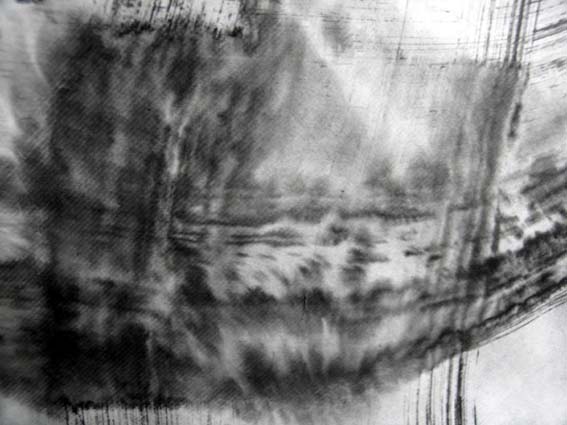
Wáng Bì 王弼 (226–249):
hànyǔ pīnyīn
重為輕根,靜為躁君。
zhòng wéi qīng gēn ,jìng wéi zào jūn 。
是以君子終日行不離輜重。
shì yǐ jūn zǐ zhōng rì háng bú lí zī zhòng 。
雖有榮觀燕處超然。
suī yǒu róng guān yàn chù chāo rán 。
奈何萬乘之主而以身輕天下。
nài hé wàn chéng zhī zhǔ ér yǐ shēn qīng tiān xià 。
輕則失根,躁則失君。
qīng zé shī gēn ,zào zé shī jūn 。
[ The example of the sage might mould the ideal ruler, to cultivate serenity (ch. 16) and Inner Power (ch. 54), purity and tranquility (ch. 45) [Hán Fēizǐ 韓非子, ch. 21].
[ The wise men show the way how to avoid the sources of selfishness and the traps of temptations (ch. 44, 46) and to solve difficulties even before they arise (ch. 63, 64).
[ They show them the way towards a well-balanced harmony of seriousness and serenity.
01-02:
Heavy serves as root of the light,
calm as mastery of the restless.
We follow here some illustrations by the unsurpassable Victor v. Strauß (1870!):
01 The heavy mountain bears the forest, whose wood bears the light leaves and blossoms, the gentle haze of clouds rises from the heavy waters – these paradigms show: the heavy is the bedrock of the weightless.
02 The immovable riverbed dictates the course of the moving water, the restless wind breaks against solid walls – these paradigms show: calmness masters the commotion.
03-06:
So wise men walk all day,
not leaving their baggage's heaviness.
Although they have brilliant prospects,
they stay composed, thus transcending them.
03-04 The wise will walk the whole day long, without leaving their heaviness: only the bare necessities as baggage, the burden of their life, their cheerful seriousness.
True rulers do not depart from the rules of responsibility.
05-06 Wise men and rulers are not distracted by magnificent mansions and prosperous prospects, nor by tempting towers and towering temptations: they remain calm and aloof [Wáng Bì 王弼], unhurried and indifferent [Chan], quiet and undisturbed [Duyvendak], serene like a swallow's flight [v. Strauß].
07-10:
How could rulers
of myriads chariots,
due to pure selfishness,
take lightly all world?
Lightness lets lose roots,
restless lets lose sovereignty.
07-08 Ten thousand chariots are the power of an emperor: selfish rulers are breezy and frivolous, impetuous and thoughtless, with regard to their own person.
09-10 "The light [and impetuous] cannot press down [sic!; 'suppress'] the heavy [and calm]. 'He will lose the basis' means he will harm his own person. 'He will lose his princely [position]' means he will lose his position as the [sic!] prince."
Hence, they will lose their basic roots, as well as their sovereign position, and thereby their integrity – without heavy waters and the immovable riverbed...
[
27 - True Mastership
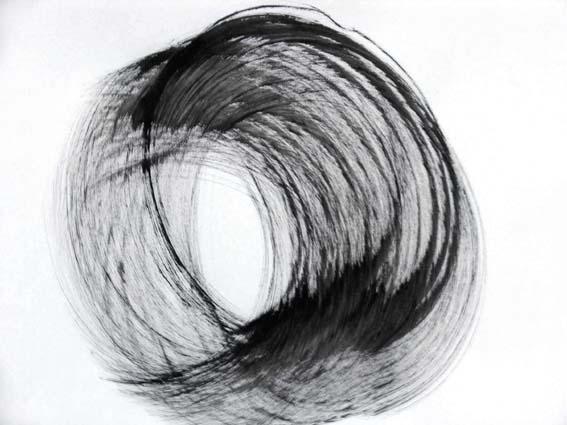
Wáng Bì 王弼 (226–249):
hànyǔ pīnyīn
善行無轍跡。善言無瑕謫。
shàn háng wú zhé jì 。shàn yán wú xiá zhé 。
善數不用籌策。善閉無關楗而不可開。
shàn shù bú yòng chóu cè 。shàn bì wú guān jiàn ér bú kě kāi 。
善結無繩約而不可解。
shàn jié wú shéng yuē ér bú kě jiě 。
是以聖人常善救人,故無棄人。
shì yǐ shèng rén cháng shàn jiù rén ,gù wú qì rén 。
常善救物,故無棄物。是謂襲明。
cháng shàn jiù wù ,gù wú qì wù 。shì wèi xí míng 。
故善人者不善人之師。不善人者善人之資。
gù shàn rén zhě bú shàn rén zhī shī 。bú shàn rén zhě shàn rén zhī zī 。
不貴其師、不愛其資,
bú guì qí shī 、bú ài qí zī ,
雖智大迷,是謂要妙。
suī zhì dà mí ,shì wèi yào miào 。
This chapter shows the Dàoist way to understand goodness and efficacy in practical tasks, in treating human beings and other creatures, as well in in teaching and education.
01-07:
Good travelers
leave neither track nor trace;
good speakers
make neither faults nor flaws;
good reckoners
use neither tallies nor tablets;
good locksmiths
need neither bar nor bolt –
yet not to open;
good binders
take neither rope nor knots –
yet not to loosen.
Dào's way to solve problems is not sophisticated, but simple, avoiding artificial means, preferring natural, plain, humble solutions, often using the hidden power of paradox.
We follow here Wáng Bì 王弼 "himself"(!): the sage let people act by their natural spontaneity, without interfering by initiating.
01 Hence, travelers on foot or travelers with a baggage cart "attain their goals, but there are no tracks": guiding tracks of the sage.
02 "Blameless" will be the one whose speech "adapts to the nature of other beings... without analyzing them".
03 Good calculators do not need any 'counting rods' or other artificial means like a tally [stick], but 'it tallies'... [the calculations add up].
04-05 "Mastery reveals itself in simplicity": a masterly closer (locksmith) is able to lock very simply and reliably without using bar and bolt [lock and catch].
06-07 To tie strings without any knots, and "still the tie cannot be undone": the sage "neither gets other beings ready nor makes them do something".
Like in all five examples, people are not controlled, thus they can follow their own nature.
08-13:
Therefore, wise men are...
always good at protecting people,
hence without ever abandoning men;
always good at saving creatures,
for never abandoning creatures.
This is called: following enlightenment.
Dàoist "humanism" is based not on regulating human behavior through punishment, but on learning from example and on compassion, never abandoning Human Dignity [Simon] (ch. 49).*
08-09 After goodness in individual abilities (01-07, Lǎozĭ turns to social goodness: wise men are human beings who help other human beings or even save them. This goodness is constant, this helping is a way of saving them.
10 No restrictions, no conditions, no segregations: Dàoist helping means saving all human beings: never abandoning any human being.
11-12 Dàoist helping also means saving all creatures: never abandoning any creature.
13 This saving people and creatures – saving Human Dignity and the dignity of all life – happens
[ in accordance with,
[ harmonizing with,
[ and based on
enlightenment and spiritual clarity.
14-18:
Hence: good men are
not good men's teacher,
not good men are good men’s challenge.
Not honoring their teacher,
not loving their challenge:
although knowledge, great delusion;
this means an Essential mystery.
Teaching is not mere knowledge transfer, but learning from the example, in 'modern' motivational style.
True education is devotion from both sides, teacher and student, with mutually illumination.
14-15 Good and bad people, teachers and students, being each other's task, share a challenging 'win-win-situation'; hence, in a Dàoist perspective, they are each the other's treasure.
16-17 Honoring the good as the example that teaches, and loving the not so good as a challenging treasure: this constellation is crucial; without such honoring and loving: pure indoctrination, mere bedazzlement. [Hán Fēizǐ 韓非子, ch. 21].
18 This passage (14-18) is full of deep wisdom:
要妙 Essential Mystery [W, H, F],
妙要 Mystery of the Essential [M, m, B].
---------------------------------------------------------
*"Human dignity shall be inviolable." German Basic Law, §1; Charter of Fundamental Rights of the European Union.
[
28 - Visionary Power
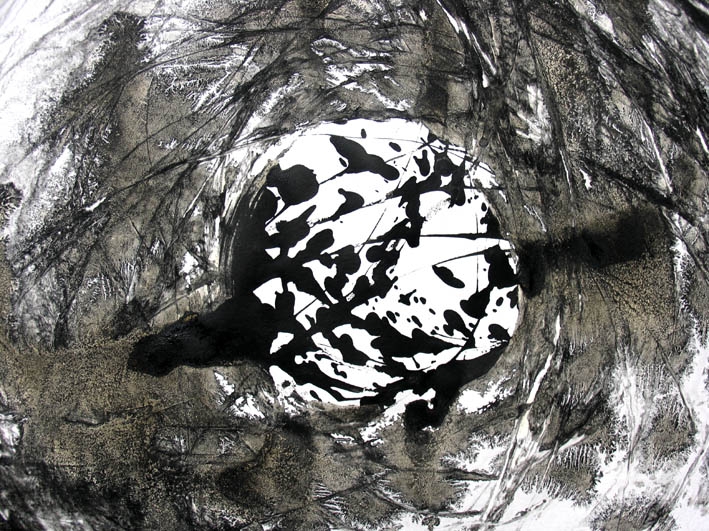
Wáng Bì 王弼 (226–249):
hànyǔ pīnyīn
知其雄,守其雌,為天下谿。
zhī qí xióng ,shǒu qí cí ,wéi tiān xià jī 。
為天下谿,常德不離,復歸於嬰兒。
wéi tiān xià jī ,cháng dé bú lí ,fù guī yú yīng ér 。
知其白,守其黑,為天下式。
zhī qí bái ,shǒu qí hēi ,wéi tiān xià shì 。
為天下式,常德不忒,復歸於無極。
wéi tiān xià shì ,cháng dé bú tuī ,fù guī yú wú jí 。
知其榮,守其辱,為天下谷。
zhī qí róng ,shǒu qí rǔ ,wéi tiān xià gǔ 。
為天下谷,常德乃足,復歸於樸。
wéi tiān xià gǔ ,cháng dé nǎi zú ,fù guī yú pǔ 。
樸散則為器,聖人用之則為官長。
pǔ sàn zé wéi qì ,shèng rén yòng zhī zé wéi guān zhǎng 。
故大制不割。
gù dà zhì bú gē 。
[ Dào lets the Inner Power of Dé work from below, and the harmony of Yin and Yang work from within, to lead creatures home to limitlessness and primordiality.
[ As rulers, wise men, in the unadorned spirit of Dào, masterfully lead all entities, out of lowest riverbed (ch. 61), in lenient devotion.
[ Perfectly parallel, the first three paragraphs follow the poetic pattern:
Know - preserve - form - constant - return... from the contrastive pairs 'manhood / woman-hood', 'lightness / darkness', and 'favour / disfavour' home to childlikeness, limitlessness, and primordiality!
01-06:
Know your manhood,
keep your womanhood:
become world's riverbed.
Becoming world's riverbed,
constant Inner Power will not leave you:
return, home to childlikeness.
The soul is androgynous, with Yin and Yang in harmonious development.
Literally, cock (in the foreground) and hen (in the background) symbolise manhood (Yang: the sunny side of the hill) and womanhood (Yin: the shady side of the hill).
01-03 Aware of its male traits, but preserving the female traits, Yang is wisely mellowed by Yin, and proves to be the bottom of the valley, the world's riverbed: confluence of all rivers and of all spirits (ch. 61, 66).
04-06 As world's riverbed, Inner Power will continuously and sustainably serve the other entities to return to the irreproachableness of a newborn child (ch. 55), and at the same time, serve large empires to flow downwards below the small states to win them (ch. 61).
07-12:
Know your lightness,
keep your darkness:
to become world's model.
Becoming world's model,
constant Inner Power will not deviate:
to return, home to limitlessness.
07-09 To be aware of Yang's brightness, clarity, and lucidity, but preserving Yin's obscurity, vagueness, and diffuseness: thus wise men become a model for the world.
10-12 As the world's model, Inner Power will not diverge from the Great One: hidden and inconspicuous, the power of integrity and virtue will, without ulterior motive and impartially, help the other beings to return to the Ultimate Nothingness. [“Infinity” Mair 1990, p.93]
13-18:
Know your favor,
keep your disfavor:
become world's valley floor.
Becoming world's valley floor,
then constant Inner Power is ample:
to return, home to nativeness.
13-15 Aware of Yang's favour, fame, and grandeur, but preserving Yin's disfavour, anonymity, and humility:
thus wise men become the bottom of the valley of the world.
16-18 As the bottom of the valley of the world, they will have enough and sufficient Inner Power, to return to the original simplicity of 樸 pǔ, that 'raw wood' of unadorned primordiality (ch. 32, 37, 57).
19-22:
Nativeness, once dispersed,
becomes then a mere tool.
When wise rulers use it,
then they develop it to officials and elders:
For 'Great carvings arise without shavings'.
The Unadorned is the truth of simplicity in naturalness.
19-21 Once dispersed, this no-frills 'raw wood' of the unadorned becomes a mere tool, an instrument with an intention, like officials as tools of the state; hence, the genuine simplicity will be destroyed.
But wise men develop into high dignitaries*, as a wise ruler into a true Sovereign for a long time.
22 Hence, the sage does not lead through sheer knowledge and political gamesmanship, but by way of ingenious plainness, ruling with leniency and in an undemanding fashion, in devoted humility:
"A master craftsman is able to restrict himself!"
_______________
* "eldest officials"
[
29 - Non-Intervention
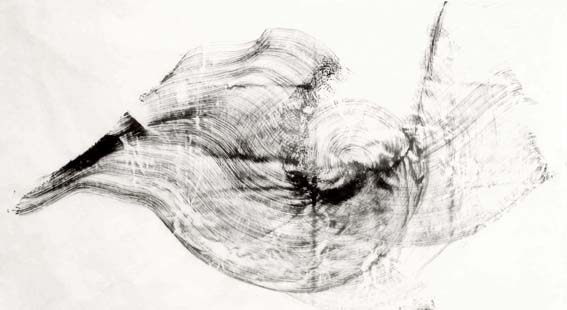
Wáng Bì 王弼 (226–249):
hànyǔ pīnyīn
將欲取天下而為之,吾見其不得已。
jiāng yù qǔ tiān xià ér wéi zhī ,wú jiàn qí bú dé yǐ 。
天下神器,不可為也,
tiān xià shén qì ,bú kě wéi yě ,
為者敗之,執者失之。
wéi zhě bài zhī ,zhí zhě shī zhī 。
夫物或行或隨、或歔或吹、
fū wù huò háng huò suí 、huò xū huò chuī 、
或強或贏、或挫或隳。
huò qiáng huò yíng 、huò cuò huò huī 。
是以聖人去甚、
shì yǐ shèng rén qù shèn 、
去奢、去泰。
qù shē 、qù tài 。
[ Non-Intervention is crucial for the unfolding of creatures as well as communities: because of the spiritual essence of "All under Heaven".
[ Appreciating variety and changeability of all things and beings, the Sage keeps to the Middle Path and to human dignity.
01-02:
Should you intend to take hold
of all world and interfere with it?
I see: that will not succeed, finally.
01-02 "All world" (everything under Heaven) also means in relatively isolated Old China... the Chinese empire!
To take hold of the state, to take over the empire: he, whoever tries this, will not succeed by any interfering (being overactive), nor by way of violent military-political annexation, but only by "acting without acting"! 無為 wú wéi (ch. 48).
Weapons are ill-omened tools, and you cannot reach your goal by (delight in) killing (ch. 30, 31).
03-06:
The world as a spiritual vessel
cannot be interfered, as well:
interfering ones destroy it,
grasping ones lose it.
03-04 The realm is not just a thing – it is a vessel filled with spirit!
Spiritual means "without form" (ch. 41), a vessel is a combination of something formless and a form, the shapeless mind fills the shape of matter: like human beings, the world is a vessel, full of spirit.
One can only act upon a form, but not upon something that is formless; hence, it is hopeless to interfere in an empire... and still hold on to it.
05-06 Because the nature of the myriad of entities' is spontaneous self-regulation 自然 zì rán, one can be receptive to them and permeate them, but not to act upon them or get them to do something [Wáng Bì 王弼].
Interfering will unavoidably destroy the essence of their shapeless, timeless nature, therefore capturing a state (as a multitude of beings) must unavoidably lose it.
07-10:
So some creatures advance, some follow,
some sniffle, others blow,
some vigorous, some weak,
some destroy, others get destroyed.
07-10 Individual and supra-individual processes demonstrate the changeability of 'every-thing'.
When there is no impulse or interference from outside [Wáng Bì 王弼], they follow the options of their Way, at first growing stronger, later on aging and departing from this life (ch. 30).
Four antithetic and parallel juxtapositions indicate the variety and destiny of all creatures; thus, a wise ruler will promote his subjects' own nature, as well as the self-development of the state... neither deceiving nor confusing either of them.
11-13:
Therefore, wise men avoid
extravagancies,
exaggerations,
excesses.
11-13 It follows from the above-mentioned insights that the sage – and the wise ruler – value the nature of all creatures; consequently, it is logical that they avoid all kinds of coercion, all action beyond natural adapting, all "loss of the center":
[ they avoid committing excesses, they do not strive for great heights,
[ they avoid the propensity to exaggerate, they are not presumptuous,
[ they evade any use of extremes, they keep to the center.
Thus, preserving the Golden Mean, they prevent the people's doom, debasement, and indignity.
[
30 - The Power of Ahimsa अहिंसा
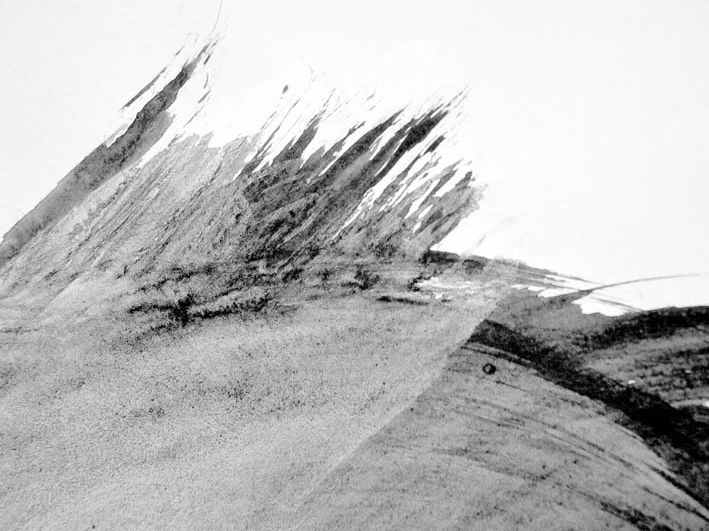
Wáng Bì 王弼 (226–249):
hànyǔ pīnyīn
以道佐人主者,不以兵強天下。
yǐ dào zuǒ rén zhǔ zhě ,bú yǐ bīng qiáng tiān xià 。
其事好還。師之所處荊棘生焉。
qí shì hǎo hái 。shī zhī suǒ chù jīng jí shēng yān 。
軍之後必有凶年。善有果而已,
jun1 zhī hòu bì yǒu xiōng nián 。shàn yǒu guǒ ér yǐ ,
不敢以取強。果而勿矜。
bú gǎn yǐ qǔ qiáng 。guǒ ér wù jīn 。
果而勿伐。果而勿驕。
guǒ ér wù fá 。guǒ ér wù jiāo 。
果而不得已。果而勿強。
guǒ ér bú dé yǐ 。guǒ ér wù qiáng 。
物壯則老,是謂不道,不道早已。
wù zhuàng zé lǎo ,shì wèi bú dào ,bú dào zǎo yǐ 。
[ This chapter is about the Power of अहिंसा, ahiṃsā, f., Sanskrit, "do not harm" = non-violence.
[ In Greek antiquity, even for the frequently compared Heraclitus, war was "The Father of all things".
[ During the Warring States Period, war was for Lǎozĭ a despicable means for achieving political aims.
01-03:
In the spirit of Dào, a people's leader
does not use weapons to attack all world:
In his affairs he prefers the retreat.
01-03 In contrast to ancient Greek Thought, war and weapons were considered by early Dàoists as destructive and myopic, the craft of war as calamitous (ch. 31).
Even if one had no choice, using weapons for defense are regarded as ultima ratio.
Attacks tend to provoke counter-attacks! In managing their affairs, wise leaders will rather strive for Returning: back to the non-violent beginning, to the roots of Oneness (ch. 34).
04-07:
Troops' encampments
let there grow thorns and thistles;
after great wars,
famine years will certainly follow.
Good ones achieve results,
yet stop then,
not daring,
thus to seize everything violently.
04-05 The epilogue to war is initially suppressed and ignored, but afterwards heinous and shameful troops bring about horrific evils: thorns and thistles [Genesis 3:18; Matthew 7:16], ruined agriculture and devastated fields, famines and diseases leave the people hungry and hopeless.
06-07 Good leaders, in the spirit of Dào, "will just get (things) done and that is all" [Wáng Bì 王弼].
Forced to bring a stop to terror and chaos, they will neither conquer nor annex, they only result at which they aim is peace and order.
08-12:
They achieve results,
yet do it not bragging,
they achieve results.
yet do it not boasting,
they achieve results.
yet do it not haughtily,
they achieve results.
yet have no choice.
They achieve results
yet do it not violently.
08-12 Thus, having got things done, good leaders do not need to show off, they do not feel any vain sense of triumph, but rather grief and sorrow like at funeral rites (ch. 31).
Wise rulers achieve peace and order BY only using weapons, when; due to circumstances, they have no alterntive: il "ne combat que par necessité" (they fight only if necessary) [Stan. Julien, 1842!].
Non-violence is the legitimate daughter of non-action 無為 wú wéi; pacifism and (reluctant) self-defense are the last step before "Love your enemies" [Matthew 5:44].
13-15:
Entities overgrow, then they age,
called not in Dào:
not in Dào ends prematurely.
13-15 Those who do not follow the way of reluctant self-defense, who attack without necessité, who misuse victory – those violent leaders will achieve temporary power, but they will be subject to a higher law:
Not following Dào's spirit, not "on the (right) Way" means quickly finished; like "Hence, neither whirlwinds last all morning, nor downpours all day" (ch. 23), swift military might will not endure.
The more quickly overgrown and prematurely changed, the farther from Dào's immutability and constancy, the sooner will premature aging and senescence follow, ending in dào-less downfall and decease, in demise and death.
[
31 - Victories for Peace
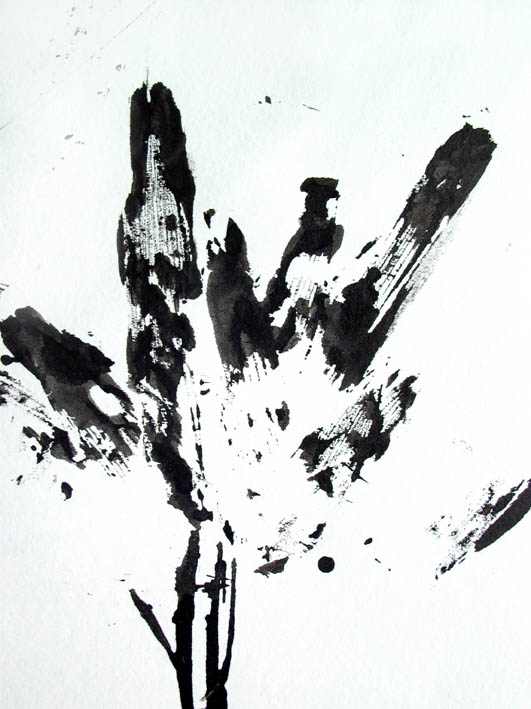
Wáng Bì 王弼 (226–249):
hànyǔ pīnyīn
夫佳兵者不祥之器,物或惡之,故有道者不處。
fū jiā bīng zhě bú xiáng zhī qì ,wù huò è zhī ,gù yǒu dào zhě bú chù 。
君子居則貴左,用兵則貴右。
jūn zǐ jū zé guì zuǒ ,yòng bīng zé guì yòu 。
兵者不祥之器,非君子之器,
bīng zhě bú xiáng zhī qì ,fēi jūn zǐ zhī qì ,
不得已而用之,恬淡為上。
bú dé yǐ ér yòng zhī ,tián dàn wéi shàng 。
勝而不美,而美之者,是樂殺人。
shèng ér bú měi ,ér měi zhī zhě ,shì lè shā rén 。
夫樂殺人者,則不可得志於天下矣。
fū lè shā rén zhě ,zé bú kě dé zhì yú tiān xià yǐ 。
吉事尚左,凶事尚右。
jí shì shàng zuǒ ,xiōng shì shàng yòu 。
偏將軍居左,上將軍居右。
piān jiāng jun1 jū zuǒ ,shàng jiāng jun1 jū yòu 。
言以喪禮處之。殺人之眾,
yán yǐ sàng lǐ chù zhī 。shā rén zhī zhòng ,
以悲哀泣之,戰勝以喪禮處之。
yǐ bēi āi qì zhī ,zhàn shèng yǐ sàng lǐ chù zhī 。
[ As a continuation of ch. 30 [lines 01-12], in the first pacifism in human history! (with self-defence), weapons as tools of warfare are now evaluated in greater details.
[ The traditional meanings of left and right in the military ranking and in civil ceremonies are here critically reinterpreted by Lǎozĭ, with a touch of humor(!), to illustrate the "loss in a win" and the appropriate grief and mourning instead of a sense of triumph after a victory.
[ Ch. 31 is one of the two chapters (along with ch. 66) not commented by Wáng Bì 王弼 as the earliest commentator of the Dàodéjīng; according to early reports, he regarded it as not original or as, in part, a commentary on ch. 30 [nonetheless ch. 31 is reproduced in all other sources, see below].
[ The lines 04-07 & 17-18 are discussed by various authors as comments that were integrated into the text later on.
[ Wáng Bì 王弼 mentioned ch. 31 only in his commentary to ch. 30: "... (the ruler) does not emulate the way of the military, but [, as the Laozi 31 says,] 'makes use [of the troops] only because he cannot help it,' what is there to brag and boast about?" [Wagner p. 222].
01-03:
Even finest weapons are
inauspicious instruments,
creatures might detest them –
wherefore Dào followers do not hold them.
01-03 The glorification of the brilliantly designed weapons of many leaders cannot hide the fact that they always are foreboding ill-omened tools, made to hurt and to kill fellow human fellows.
Creatures fear and loathe all kinds of arms and weapons, since they are injured, wounded, or killed by them.
Followers of the Dào, however, impartially show compassion and love to all entities, therefore they refuse to possess or to use other harmful tools.
04-11:
At home, then noblemen value the left side,
using weapons, then they value the right side:
weapons are ill omen's,
but not at all noble-men's instruments.
Having no choice but using them,
peace and quiet will do best.
Do win, yet not enjoying;
but delight of that were joy in killing men;
for those with delight in killing men
cannot find fulfillment on Earth then, indeed.
04-05 Because the vast majority of people are right-handed, weapons are generally used with the stronger and more skillful right arm.
At home, however, noble people use the left side for peaceful and happy occasions.
Leniency and indulgence correspond to Yin on the left side, harshness and intransigence to Yang on the right side.
06-08 Inauspicious, ill-omened tools like weapons of all sorts are normally not used by noble people who follow the Dàoist principles.
This first ever clear pacifism permits the practice of self-defense as ultima ratio, in case of emergency when there is no other choice.
Even then, persons defending themselves in the spirit of Dào will look to do the least possible harm and for a way to return to tranquility and peace.
Weakness is the true strength.
09-11 Even a victory that has been inflicted is not at all gratifying, because it has been gained by bloodshed.
To enjoy winning in war would mean to relish the killing of human beings – a total estrangement from Dào's realization in life: Dé, the Inner Power.
Even killing criminal evildoers by way of death sentence and execution would mean taking the place of the Great Carpenter. Doing the work of the natural Grim Reaper, one would hurt one's hands indeed (ch. 74).
Human beings who delight in killing other human beings: they will not manage to find their true purpose and destiny on Earth.
12-16:
On auspicious affairs
they favor the left,
on inauspicious affairs
they favor the right.
The deputy general in military
stands on the left,
the top general in military
stands on the right,
saying: let's place them like at funeral rites!
12-13 If there are occasions for celebrating happy moments, then in Chinese custom, those positive experiences are attributed to the left side; unhappy, painful events, on the other hand, like funerals for instance, these negative experiences correspond to the right side.
These sorts of civil customs, on auspicious or inauspicious occasions, 'invite' comparison with the military ones...
14-16 In old Chinese military customs, a similar dichotomy in fact existed: lower-ranking officers stood on the left; higher-ranking ones, all the way up to the top general, on the right.
The greater the responsibility for killing people in military actions, the greater the correspondence to civil burials: this symbolizes the ill-omened interference in the spontaneous 自然 zì rán self-regulation of Nature and... the Grim Reaper.
Thus Lǎozĭ points to the fact that those who have killed the most are placed on side for burials ...
17-18:
Were numerous of people killed,
in grief and sorrow beweep them;
place even battle winners
like at funeral rites!
17-18 It follows that killing many human beings is not an occasion to celebrate victory with a sense of triumph, but rather to place the victors on the side of the burial, in order appropriately to weep for the victims!
This awareness allows adequate feelings to be regained in time: "... when armed forces confront one another, the more compassionate ones prevail" (ch. 69).
[
32 - Transcendency
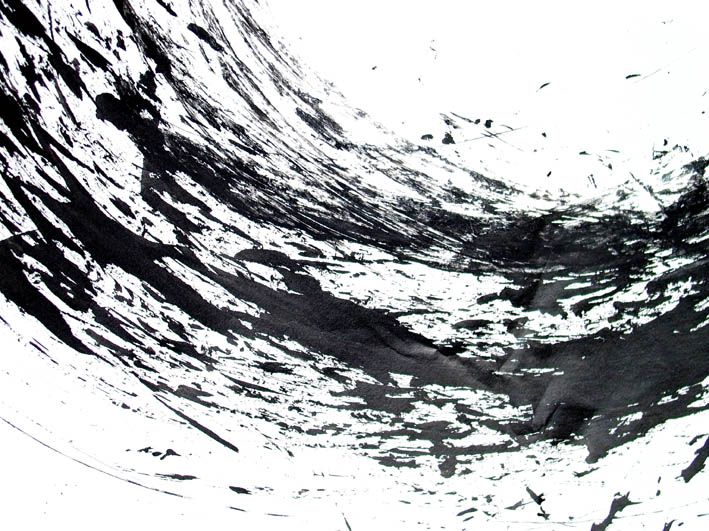
Wáng Bì 王弼 (226–249):
hànyǔ pīnyīn
道常無名。
dào cháng wú míng 。
*樸雖小1天下莫能臣也。
*pǔ suī xiǎo 1tiān xià mò néng chén yě 。
侯王若能守之,萬物將自賓。
hóu wáng ruò néng shǒu zhī ,wàn wù jiāng zì bīn 。
天地相合以降甘露,民莫之令而自均。
tiān dì xiàng hé yǐ jiàng gān lù ,mín mò zhī lìng ér zì jūn 。
始制有名,名亦既有,
shǐ zhì yǒu míng ,míng yì jì yǒu ,
夫亦將知止,知止可以不殆。
fū yì jiāng zhī zhǐ ,zhī zhǐ kě yǐ bú dài 。
譬道之在天下,猶川谷之於江海。
pì dào zhī zài tiān xià ,yóu chuān gǔ zhī yú jiāng hǎi 。
After treating the practicality of pacifism in ch. 30 & 31, Lǎozĭ goes back to the roots of primordial simplicity and the transcendency of the Dào, as the foundation of the development of social organization and communication.
01-02:
Dào: forever nameless.
Nativeness, although small, nobody
worldwide can make it serviceable, too.
01-02 The transcendental aspect of Dào, 'disguised' in absolute nothingness, "without shape and attachment" (ch. 21), will be timelessly incomprehensible (ch. 01), while preparing the tiniest and minutest something ever ("Big"(!) Bang).
The intelligent, the brave, the skillful, and the strong can be put to service for abilities, wars, business, burdens. [following Wáng Bì 王弼].
Yet, the ultimate naturalness of the uncarved block 樸 pǔ (ch. 15, 28, 32, 57), as primordial simplicity, is protected by its unadorned quality against use and misuse.
"Nothing too much" Μηδὲν ἄγαν (mēdén ágan) [Solon... s. * in ch. 33]. Keep to the unadorned and reach the Way!
03-06:
If prince and king could hold to that,
all entities were by themselves like guests.
Heaven and Earth would mutually unite,
for sending down sweet dew.
The people, under nobody's order,
and yet by themselves orderly.
03-04 If only the royal leaders could "embrace the unadorned" (ch. 19), and their spirit were "not hurt by desires" – all subjects would 'submit of their own accord, freely like guests', and "~ find by themselves their balance." [Wilhelm].
05-06 "Heaven and Earth being in harmony will induce sweet dew to fall"* – reminding a bit of
„Es war, als hätt' der Himmel
die Erde still geküsst...“
,It was as if the Sky
had silently kissed the Earth"
in: Eichendorff's „Mondnacht“
This manna-like reward would come "automatically without their striving for it" [*Wáng Bì 王弼 / Wagner], accordingly to an egalitarian-democratic intent [Kalinke].
Without interference by the wise ruler, thus by way of their true nature, the subjects become voluntarily virtuous, "regulated without being given [particular] orders" [*].
07-10:
Regulations started,
there are names.
If in turn, designations already exist,
then, in turn, you should know to cease:
if you know to cease,
so you cannot be endangered.
07-10 The beginning of language as communication is not attributed to a transcendent being or to an idea, but to people's practical social organization: "the Unadorned has dispersed" and the Sage as the Great Regulator... deploys officials and elders." (ch. 28). Then names and classifications will determine 'the honorable and the lowly'... [Wáng Bì 王弼].
To master the dangers of description and naming, as well as the loss of primordial simplicity 樸 pǔ, only understanding how to cease, and to stop hazardous developments, will help to manage the resulting social conflicts.
11-12:
Symbolizing Dào's existing in the world:
like the flow from rivulets
into rivers and ocean…
11-12 To symbolize the Way, which is practiced 'Everywhere Under Heaven', the suppleness of water is used again: "The rivulets ... are not striving [to flow into] the rivers and seas", and the flow is "not caused by the rivers and seas calling them" [Wáng Bì 王弼 / Wagner], they flow of their own volition!
Natural, spontaneous self-regulation without interference thus illustrates the mysterious course of the water, as well as the mystery of the Way of the Dào.
_________________
* "Sweet dew" [Chinese myth]: the morning dew would taste like honey, when the realm is in perfect peace.
[
33 - Enlightenment
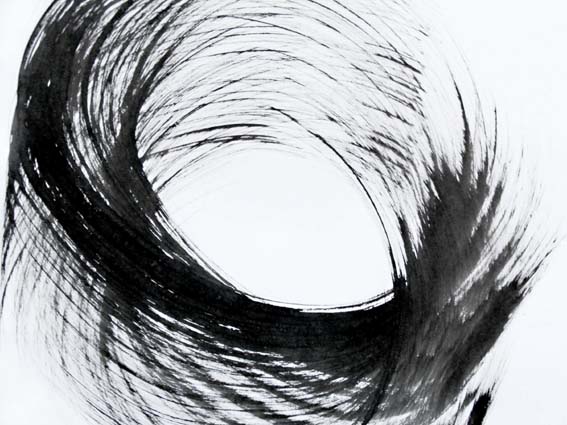
Wáng Bì 王弼 (226–249):
hànyǔ pīnyīn
知人者智,自知者明。
zhī rén zhě zhì ,zì zhī zhě míng 。
勝人者有力,自勝者強。
shèng rén zhě yǒu lì ,zì shèng zhě qiáng 。
知足者富。強行者有志。
zhī zú zhě fù 。qiáng háng zhě yǒu zhì 。
不失其所者久。
bú shī qí suǒ zhě jiǔ 。
死而不亡者,壽。
sǐ ér bú wáng zhě ,shòu 。
A chapter famous for both the Chinese "Gnothi seauton" at the beginning and the "dying, yet no doom" line at the end – with multiple interpretations.
01-04:
Knowing others – intelligence,
knowing oneself – enlightenment;
overcoming others – force,
overcoming oneself – strength.
01-02 [A ruler who]
[ knows, understands, sees through others... (merely) has intelligence (knowledge about them): yet this "is nothing compared to seeing through oneself". [Wáng Bì 王弼 / Wagner]*
[ knows, understands, sees through himself... has enlightenment (knowledge about one-self): because there "is nothing compared to using one's intelligence on oneself... the other entities will then not evade you!"*
- Of course, this passage was often compared with "Gnothi seauton":
γνῶθι σ[ε]αυτόν, gnōthi s[e]auton; nosce te ipsum, temet nosce = "Know Thyself".*
03-04 [A ruler who]
[ overcomes, defeats, vanquishes others.. (merely) has force (control of them): yet this "is nothing compared to vanquishing oneself [as] there is no other entity able to wear down one's strength.*
[ overcomes, defeats, vanquishes himself... has strength ("powerfully practices [the Way]"): if "one's strength is used on oneself, the other entities will be without cunning".*
05-08:
Knowing, when enough: wealth,
forceful advancing: willpower;
not losing one's place: endurance;
dying, yet no doom: longevity!
05-06 [A ruler who]
[ "knows how to have enough, will be wealthy ... will automatically have no loss" [*].
[ "powerfully practices [the Way], will impose his will. [*].
Cf. ch. 41: Superior scholars hear of Dào, strive and practice it: "Practising [the Way] to the utmost of his capacities ... he will necessarily have his will satisfied."*
07-08 [A ruler who]
[ "does not go astray from his place, will stay long [at it]. If with "enlightenment he investigates himself (...) and measures his strength and acts [accordingly]"*, not leaving his place, he will endure.
[